gair rhydd
9th


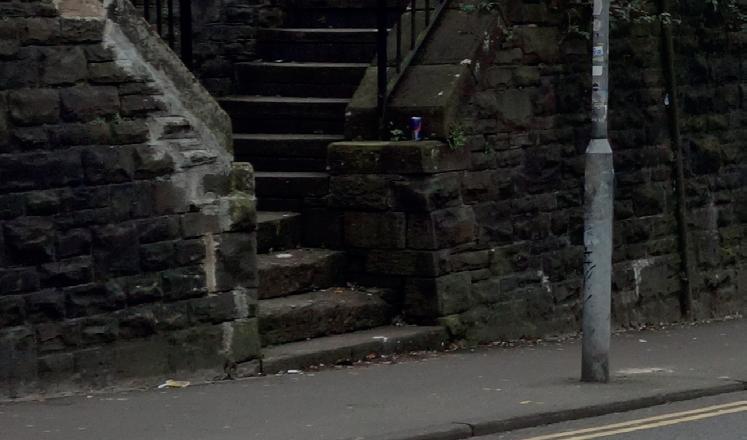
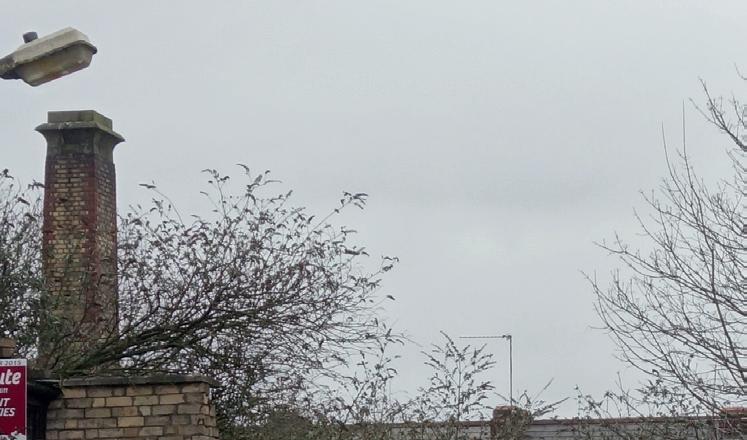


In this week’s issue: What it’s like to be engaged at university, where parties stand on devolution in Wales, why Ketamine is your friend, and the return of the Green Party society







Student “could have been killed” in attack
Police appeal for information after “aggressive” driver attempted to hit pedestrian Victim
Police are appealing for information after an attempted assault on Lowther Road last Saturday.
Cardiff University student Duncan Leigh was walking home from the Students’ Union when it appeared that a vehicle was driven directly towards him in an attempt to hit him.
Leigh was wearing military surplus gear as part of an Airsoft event he had attended that evening, and it is thought that this may have made him a target. Te incident took place on 28 February at around 21:00, shortly after the event ended.
Speaking to Gair Rhydd, Leigh said that there was a moment where


he genuinely believed that he might have been killed: “For a split second, I thought, fuck, there’s nothing I can do, and that it could have been the end.”
He was spared when the driver swerved away to avoid an oncoming car. Witnesses have claimed that there was “no way” Leigh could have avoided the vehicle if the driver followed through with the attack.
Details on the incident are scarce, with no apparent suspects and no clear motive. However, it is not believed that the attacker simply lost control of the car.
Leigh told Gair Rhydd: “Te driver aggressively revved the engine multi-





ple times and sounded the horn before the car turned to hit me.” After the attack was unsuccessful, they sounded the horn a second time before driving away. Tey made no attempt to check Leigh’s welfare, nor the welfare of the oncoming car’s driver.
Te stretch of Lowther Road where the incident took place has little lighting, and a number of street lamps have been been out of order for an extended period of time. Leigh said that he “couldn’t have seen anything in the darkness.”










She was accompanied by Rahul Modhavia, who told Gair Rhydd that he thought the car was a recent model VW Golf that looked like it had been “racered up.”
Modhavia was disgusted by the incident: “Te driver should receive a ban.”
Neither the victim nor any witnesses were able to identify any of the driver’s characteristics, or even if there were any passengers, because the street was in darkness. Rachel Roberts, a witness, said that neither she nor anybody else on the scene managed to memorise the number plate of the vehicle. Roberts said that she initially thought the incident was a “sick sort of greeting.” She said that Leigh “could have easily been killed or seriously hurt.”

Continued on page 4
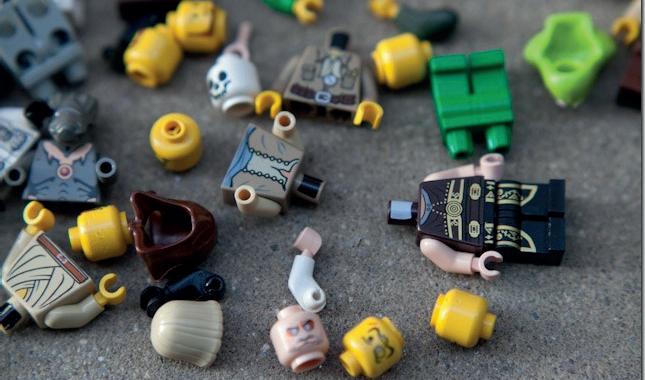
Monday March
2015 | freeword | Issue 1047
EXCLUSIVE Michael O’ConnellDavidson
Pictured: Lowther Road where the incident took place
“My experience with depression” P11 >> What Nemtsov’s murder means P16 >> Head transplants “possible in two years” P22 >>
might have been mistaken for a member of the armed forces
THE FREE WORD
EDITOR
Michael O’Connell-Davidson
GAIR
RHYDD
Elaine Morgan
NEWS
Georgia Hamer
Katie Evans
Alexander Norton
Anna Lewis ADVICE
Kirsty Fardell
COMMENT
Anne Porter
Gareth Evans
Olivier van den Bent-Kelly
COLUMNIST
Jason Roberts
POLITICS
Carwyn Williams
Lauren Boyd
Rhiannon Tapp
SCIENCE
Shanna Hamilton
Meryon Roderick
SOCIETIES
Hannah Sterritt
TAF-OD
Steffan Bryn Jones
Morgan Owen
SPORT
David Hooson
Rory Benson
Joe Atkinson
PRODUCTION EDITOR
Sum Sze Tam
EDITORIAL ASSISTANT
Jack Boyce
DIGITAL EDITORS
Jordan Adams
Gregory McChesney
SOCIAL MEDIA
EDITOR
Maria Mellor
Want to join the team?
Editorial conferences are each monday at 5PM. Proofreading takes place on Thursdays at 6PM in the media office during print weeks.
Write us a letter letters@gairrhydd.com Tweet us: @gairrhydd Online at: gairrhydd.com
Recognising courage
I was speaking to somebody in the office earlier today when they joked that they were in danger of forgetting the surnames of friends who had become (or were training to be) teachers. For some reason, those involved in secondary and primary education are a little stiff about their social media presence, and so many change their surnames to mask their identity online, because heaven forbid any teachers live lives outside of the grounds of their schools.
We live in an era that’s becoming ever-more liberal. I feel as though the progress of civil rights - gay marriage, equal pay - is inevitable, and despite judges in Alabama forcing their agendas on an unlucky few in the U.S.A., I don’t really see any evidence that might suggest we might lapse back into a more ‘traditional’ society any time soon.
With that in mind, it seems odd to me that people have become so coy about details about their personal lives. Fucking hell, it’s not the 1920s anymore; people drink, they take photos, and they post illadvised memes on their personal Facebook profiles. Conservative parents of the world, the people teaching your children might like heavy metal, and you’re going to have to get over it.
People obscuring themselves is a worrying trend that’s become absurdly common now that it’s so easy to track people down online. Employers, lecturers, hell, just about everybody.
Tat’s why I’m proud of this issue of Gair Rhydd. While members of the student community have generally declined to provide permission to print their names when they have offered quotes and evidence for stories we’ve run over the past year, this issue is different. Duncan Leigh agreed to be interviewed for this issue’s cover story, and was extraordinarily brave to volunteer.
It’s hard to describe how difficult it is for the victims of crime to speak about their experiences, especially so soon after the incident. But everybody involved knew how important it was to raise aware-
ness of the situation and maybe even catch the driver who instigated the attack in the first place.
Tat sort of work is reporting that we engage in to serve the public interest. And I think we’ve achieved things that benefit the public, even if, in the short term, it’s just getting the street lamps on Lowther Road fixed. Leigh and those who were witnesses last Saturday were extremely helpful, and we couldn’t have done it without them.
But consideration should also be given to Anne Porter, our Comment editor, who is pictured on the front page. Anne has written a fantastic piece about her experience of depression. Not only has she attached her own name to the article, but her face, too.
Again, it’s hard to put into words what makes this a courageous act. Mental health stigma is very real, and nobody wants to risk being tainted in the minds of their peers. Unfortunately, those with mental health difficulties are too often treated as ‘weird’, their actions judged through a prejudiced lens.
And that’s what makes Anne’s decision to appear on the cover and attach her name to the article so important. Anybody who’s met her knows that Anne’s as normal as normal can be; indeed, her academic record and personal life is something a lot of people could do worse than to strive towards. She’s proof that admitting you have depression isn’t strange. It can happen to anyone.
I’ve written fairly extensively about mental health. Sometimes under my own name, sometimes anonymously. Her work fills me with pride, and it’s my honour to include her words in this publication. Few editors have been lucky enough to work with this sort of raw material, and fewer still have had the fortune to work with this much good work within the space of one issue.
I can’t say why the subjects of this issue’s leader have been so forthcoming. I’d like to think that our Students’ Union election coverage proved to the student body that we’re able to handle things like adults.
Everybody here is civic-minded, and they believe in our audience. It’s my hope that this year we’ve started building bridges between ourselves and the student community so that they might start trusting us too. Maybe then people will be more forthcoming with their identities. If we score more significant victories, then, it may be that attaching your name to a Gair Rhydd article won’t be seen as a risk, but an important gesture towards change the people want to see.
It’ll take a long time. It’ll take more than I have left, that’s for sure. Maybe it’ll take longer than my replacement has as editor. But it has to happen, and I think if we keep doing good work in the name of the public, it will.
It worries me that people would rather abstain from conversations than risk the trouble that comes with sticking your neck out for something you believe in. I don’t think the public sphere can survive if people are afraid to speak.
And of course people do speak. Tey speak on Twitter and in the Taf. But journalism has a way of curating conversations and recording things that need to be said. Tose conversations are much more powerful if those speaking don’t feel like someone’s breathing down their necks.
While neither Duncan nor Anne could be cosnidered whistleblowers or anything particularly controversial, they’ve got courage that other students could learn from. Hell, they’ve got courage that even I could learn from, and my name’s printed several thousand times each week.
For sharing their experiences and their identities, they deserve our applause. If you’re reading this and you’ve been influenced by the testimony of either, then you can get in touch with me and the team using the contact details on the left of this page. If you’ve got something important to say, we’re listening.
- MOCD
THIS WEEK IN HISTORY: GAIR RHYDD 88
11/3/1981














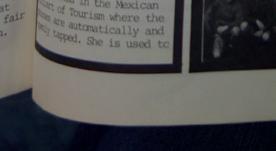









Because I’m sure you’re all tired of hearing me prattle on about our wild plans each week, I’m trialling a new regular feature called “this week in history.” Now, I’m sure more interesting things happened on a far flung March 9th in the past. But we’ve got an archive full of old issues of Gair Rhydd, and this newspaper has a long, strange history.
I’ve written a great deal on these pages about what this newspaper might be, and how it’s sort of lost its place in the modern era. I haven’t really looked into the past, though. Gair Rhydd was different. It was pretty weird.
Pictured left is one of the issues edited by Meirion Jones. Today, Jones works as the investigations editor at Newsnight. But thirty-five years ago Jones was the editor of Gair Rhydd (he was the first full-time, paid editor, in fact).
So what was on the agenda 35 years ago? “I fought the law and the law won,” the lead article, describes a case in which a Cardiff Student was acquitted of a crime. Colin Tollervey was accused of assaulting police in a demonstration against Margaret Tatcher, but the evidence was patchy and the charge was overturned. He wasn’t the only student on trial; nearly 20 others were also acquitted.
Te article “1984” outlines a series of allegations that the union was being wiretapped by the Ministry of Defense. “On one occasion, a secretary tried to dial out and was connected to a Ministry of De-
fence conversation.” I suppose that this is relevant today, following the Snowden revelations; the only real difference is that it’s GCHQ who does most of the wiretapping.
One individual who noticed the wiretapping said that it “didn’t particularly worry” her. In fact, her reaction seemed to treat the whole thing as though it was fairly mundane: “Strange things are happening, but it’s not something I take particularly seriously.”
Te article describes tapping the phones of political organisations as “standard practice.” While that might be true, I think it’s super interesting that anyone might have described Cardiff Students’ Union as a political organisation, because it’s certainly not any more.
35 years is a long time. Students’ Unions have changed (we have a CEO, for christ’s sake). But so too have students. Te politics of protest, of students actually demonstrating against the things they disagree with... Tat seems like ancient history. Neil Kinnock was president of Cardiff Students’ Union at one point. With the greatest respect to Elliot Howells, he and Kinnock seem like members of two seperate species.
What else? Well, they had a contributor called Kate Middleton, which is quite funny. And even in the 80s, writers were saying it was hard for graduates to find jobs. While student attitudes are different now than they were then, other things never change.
CO-ORDINATOR
At Gair Rhydd we take seriously our responsibility to maintain the highest possible standards. Sometimes, because of deadline pressures, we may make some mistakes. If you believe we have fallen below the standards we seek to uphold, please email editor@gairrhydd.com. You can view our Ethical Policy Statement and
expressed in editorials are not reflective of Cardiff Students’ Union, who act as the publisher of Gair Rhydd in legal terms, and should not be considered official communications or the organisation’s stance.
Complaints Procedure at cardiffstudentmedia.co.uk/complaints Opinions
Gair Rhydd is a post office registered newspaper.
Joe Atkinson
Campus In Brief

Hundreds of Cardiff students backed a petition to undertake a referendum asking whether the Students’ Union should have a full-time Welsh language sabbatical officer. Te petition, put forward by current Welsh Language Officer Steffan Bryn Jones, required 500 signatures to go through, though a date for the referendum has yet to be set.
A student was almost killed in an attempted assault on Lowther Road. Duncan Leigh, 22, was on his way home from the Students’ Union when a driver deliberately swerved to hit him. Police continue to investigate.
Te Students’ Union has come under scrutiny after it was revealed that a number of senate-level decisions have not been enforced. Additionally it has transpired that the senate did not meet during the week after student elections, one of the most significant dates in the student political calendar.
A 20-strong group of volunteers were the first people to have their brains scanned while on LSD, in an investigation undertaken at Cardiff University involving former government advisor Professor David Nutt. Te participants described some anxiety and temporary paranoia, but none described the experience as being negative, while there was evidence to suggest that the drug and similar psychedelic substances could be used to treat depression and alcoholism.
Another study involving the university’s European Cancer Stem Cell Research Institute in conjunction with other research has sought to use stem cells in order to develop ways to identify the most aggressive forms of breast cancer in women at the earliest stages to help prevent the spread of the disease and increase chances of survival.
A number of Cardiff University’s sports clubs have excelled by reaching the BUCS Conference Finals that take place on March 18th. Te university’s women’s 2nd hockey and netball teams will attend, as well as the men’s 1st squash and tennis teams, as BUCS fixtures start to wind down in the build-up to this year’s Welsh Varsity in April.
NATIONAL
Te prime minister was described as “running scared” from the prospect of televised debates after rejecting a one-on-one clash with Labour leader Ed Miliband. David Cameron wants to go ahead with his proposition for a single debate involving the leaders of the Conservatives, Labour, Liberal Democrats, UKIP, Green, Plaid Cymru and the SNP. However, Cameron faces the prospect of being ‘empty-chaired’, as the BBC, ITV, Sky and Channel 4 have pledged to go ahead with their live planned debates.
Lib Dem leader Nick Clegg meanwhile engaged in a heated radio debate with a member of UKIP about which of their parties would “fade into obscurity” following the general election. Clegg bet six pints on UKIP becoming “a tiny pipsqueak of a party”, before muttering, “I don’t even drink beer” under his breath. Another empty promise.
Meanwhile a poll forecast the SNP to win 56 of the 59 parliamentary seats in Scotland. Tis significant gain for the party would spell trouble for Labour in particular, as it would severely offset any gains made in the rest of the UK. If the poll becomes reality, there could be a potential dead-heat between the two main parties come the big day in May.
A number of England’s 2005 Ashes-winning side are facing “very substantial” tax bills after becoming involved in tax-avoidance schemes. Players including former captain Michael Vaughan, as well as prominent squad members Matthew Hoggard, Paul Collingwood and Ashley Giles, have found themselves caught up in the controversy.
An armed robber who raided a Tesco store in King’s Lynn was apparently caught by police having posted the status, “Doing. Tesco. Over”, on Facebook. Tis was fifteen minutes prior to making off with £410 from the store, and police alerted by his post subsequently arrested him. 32 year-old Andrew Hennells admitted robbery at Norwich Crown Court.
INTERNATIONAL
Despite its international success, India has banned screenings of Fifty Shades of Grey, and the edited versions with sex scenes removed. Te ban follows similar measures from Malaysia and Indonesia in Asia, as well as Kenya in Africa. Te film has made near $500million since its release last month.
A number of fresh details of Mohammad Emwazi’s life have come out since his outing as ‘Jihadi John’ last week. All manner of details, from his school career to details of his family to his time as an ‘excellent’ and ‘model’ IT salesman, have come out in the British press since his identity was revealed.
Te West-African country of Liberia, one of the three worst affected by ebola, released its last patient to have been afflicted by the disease, and hasn’t reported any new cases in more than a week, raising significant hopes in the battle against the disease, though it continues to infect and kill people in Guinea and Sierra Leone.
Te beloved president of Uruguay José Mujica stepped down after five years in office. Te 78 year-old, whose relaxed and humble leadership style earned him worldwide admirers, donated 90 per cent of his salary to charity and was known for living like the majority of his compatriots
Te mayor of Copenhagen put forward controversial plans to rename the southern Swedish region of Skåne as ‘Greater Copenhagen’. Disregarding the diplomatic minefield that is generally associated with rebranding a part of a neighbouring country, Frank Jensen promoted the move, claiming that it would lead to increased tourism to the area.
A specimen of human jawbone found in Ethiopia, aged at 2.8million years old, and 400,000 years older than scientists believed, is thought to be from one of the very first humans. Te discovery has expanded scientific understanding of our evolution as a species from tree-dwellers to upright walkers.
Pictured: Nicola Sturgeon, leader of the SNP. A recent poll suggested the party could win 56 of 59 seats in Scotland.
A 20-strong group of volunteers were the first people to have their brains scanned while on LSD in an study undertaken by Cardiff University “
3 EDITORIAL
”

A friend of the victim told Gair Rhydd that Leigh ‘hasn’t seemed like himself’ since the incident
Cont’d: Student “could have been killed” in attack
He continued: “If they’d hit the accelerator rather than the brake when they turned away from [Leigh] then he would have been hit for sure.”
He added that dangerous driving on this road was nothing new: “I often see people racing down Lowther Road, but I’ve never seen anything so stupid. I can’t imagine how frightening the experience must have been.”
Another witness, Luke Berry, confirmed reports that the car was driving dangerously, and expressed frustration that the driver had not been caught yet: “I can’t imagine that they started driving like a sane person after the incident.” Luke described the vehicle as being “black or dark blue.” Like Modhavia, he said that he believed the vehicle was a VW Golf.
Leigh said that the driver’s attempt to hit him looked like the result of a “spur of the moment” decision. He also said that he did not believe that the driver was drunk: “If the driver was drunk, then I don’t think they would have been able to avoid me when they swerved away.”
Leigh said that he did not want to speculate as to the motive of the attacker. But, as he was wearing combat trousers and carrying a gun case that he had taken to the Airsoft event, it is believed that he might
have been mistaken for a returning serviceman. “A police officer who visited me after the incident advised me not to wear camouflage in future,”
Leigh said.
He added it was equally possible it was simply a random act with no specific intent. “Half of me thinks it was because of the gear. But the other half thinks the perpetrator was just a bastard.”
A South Wales police spokesperson confirmed the incident: “We are investigating a suspicious incident which was reported shortly after 10.00pm on Saturday 28th February.”
“A 22 year old man was walking along the pavement of Lowther Road between Salisbury Road and Richmond Road at around 9.00pm when a motor car is reported to have driven towards him, clipping the kerb.”
“Te vehicle is described as a dark coloured hatchback.”
Airsoft is a sport where participants engage in mock firefights with model firearms. Airsoft groups across the UK have warned members not to wear combat uniforms to and from events. A post on the ‘UK Airsoft Community’ Facebook group, which was shared by society presidents at students’ unions with airsoft societies,
said that “given what was happening in the world,” it was “sensible” for those attending events to get changed at venues as opposed to wearing army uniforms while travelling.
Te post made reference to the military, where servicemen have been advised not to wear uniforms when travelling to and from bases.
Leigh has been left traumatised by the event, and has been referred to a mental health service by his GP. He also said that the Student Support Service at Park Place has been very helpful: “Tey have told me I can come back any time if I need extra support.”
While he says that “talking helps,” his interview with this publication was part of the first time he had left the house since the incident. “It took me an hour to build up the courage to leave the house. I had to pass the site of the incident on the way to this interview. I’m not sure of my own safety anymore.” He told Gair Rhydd of a diminished appetite, and that he had eaten very little since the event. Sleeping has also been difficult.
James Clarke, a friend of the victim and President of Cardiff University Airsoft Society, told Gair Rhydd that Leigh “hasn’t seemed like himself” since the incident. Clarke says that
he believes this is the “first time an airsofter has been targeted like this.”
Clarke provided Gair Rhydd with a draft statement from the Airsoft Society advising members to avoid wearing full camouflage. “We recommend half greens (camouflage bottoms and a different top), as not only does this mean that you do not have to fully change after an airsoft meet, but as it is also obvious to the general public that you are not a member of the British military.”
Te statement added that this was only a recommendation, and did not represent a change in their guidelines.
When queried about the state of street lighting on Lowther Road, a City of Cardiff Council Spokesperson said: “We inspect all our street lamps on a regular basis and at the time of the last inspection there were no faults on Lowther Road.”
“We deal with all reported faults as quickly as possible and due to the seriousness of this incident we will ensure that the lights on Lowther Road are repaired within 48 hours.”
“We would encourage anybody who sees a problem [with street lights] to report it via our C2C contact centre on 029 2087 2087 or online via www. cardiff.gov.uk so that we can remedy any faults.”
Stop the press: student publication on verge of closure
Former editor accuses company of “mistreating” staff

Anyone who may have witnessed this incident or who may have any information concerning the vehicle involved is asked to contact South Wales Police on 101 and quote reference 1500070561
My contact with head office was shoddy throughout my time with them [...] finding the motivation to continue was becoming difficult
Jade Attwood
Cardiff
University Paper Editor

Student publication ‘Te University Paper’ is reportedly in the midst of severe financial difficulties just seven months after its introduction to Cardiff
In August, the organisation announced plans to roll out locally focused newspapers at sixteen cities across the UK.
Te Welsh capital’s edition focused on news and lifestyle issues affecting students at Cardiff University, Cardiff Metropolitan University and the University of South Wales.
Te publication, which was founded two years ago by Nottingham Trent University student, Chris Moss, had hoped to raise its monthly circulation to 1.2 million nationally.
Tis was to be achieved through a collaboration with Simian Publishing, the institution behind ‘Loaded’ magazine.
Following the initial roll-out, there were reports that ambitious plans had been put in place to expand the publication to feature a further fourteen cities by January of this year.
However, it has now emerged that the publication is struggling under the financial burden of its sudden expansion – and is now likely to cease all local publishing.
Editor of the Cardiff edition of the University Paper, Jade Attwood, told Gair Rhydd that she first became aware of the problem through a social media group set up by her colleagues nationwide.
“I thought my problem was pretty
isolated but then I found out it was a country-wide issue with all of us receiving the same mistreatment,” she said.
She added: “To be honest contact with head office was shoddy throughout my time with them so finding the motivation to continue with the paper was becoming difficult.”
Te Cardiff-branch of the newspaper had suffered a series of staff resignations following a difficult beddingin period for the organisation.
“Te first few months were pretty difficult,” one former employee told Gair Rhydd.
“I don’t think the physical copies of the first few issues were delivered beyond one or two locations and my work was often attributed to someone else who worked for the organisation in a different city.”
“Quite a lot of my content was heavily reworded to fit the tabloid agenda, whilst some of the images didn’t fit the stories at all.”
Matters had reportedly improved in recent weeks, with content correctly attributed and issues appearing at multiple pick-up points across the city.
However, the paper is now reportedly set to end publishing locally.
“It is a shame as I loved doing the work and I think the concept was there but the execution was just poor,” Attwood said.
“It was embarrassing having to relay it all to my editors but they were very understanding.”
“
The publication is struggling under the financial burden of its sudden expansion
Continued from front page
“
”
tweet us @gairrhyddnews email us news@gairrhydd.com or visit us online at gairrhydd.com/news
NEWS
Georgia Hamer
Pictured: Te front page of the last issue of the Cardiff Edition of Te University Paper (Credit: Unipaper Ltd. )
” “
”
Student Senate postponed due to low turnout
Less than half of the 40 elected senators were available to attend
AStudent Senate meeting has been cancelled due to low senator turn out, only a week after student election results were announced.
Te meeting was cancelled after failing to become quorate, with less than 21 of the 40 senators planning to attend.
Te meeting was planned to take place only a week after the student elections, with six senators having run for officer positions.
Low student turnout has become a recurring issue within Student Senate
(source:
One senator speculated that the low engagement in student politics follows the involvement of some senators during campaign week.
According to an anonymous senator, low student turnout has become a recurring issue within Student Senate towards the end of the academic year.
“It’s frustrating, especially given that we’ve already had previous problems this year with people not attending it.”
Te news news after Gair Rhydd reported in April 2014 that a previous
Senate meeting was made redundant after four hours of debate. Te votes were rendered void after the number of senators fell below the required 21.
However, the motions for the meeting in April were not resubmitted for the following Senate meeting in November.
A Senate meeting was also delayed in December after struggling to meet minimum student numbers and the absence of a Student Senate chair.
Te agenda for the cancelled meet-
ing included a motion to ban products from BAE systems, after the motion was rejected at the AGM in December.
Other motions included a proposal to create awareness for carbon monoxide poisoning and increased integration of international students with a suggested ‘buddy’ system.
A motion was also included to lobby the Union for more ethical and sustainable electrical items and better working conditions.

Acid test: Cardiff Uni LSD study proves surprising
Groundbreaking research conducted by Cardiff University into the effects of LSD has ground to a halt after traditional funding bodies refused much-needed financial help due to its controversial nature.
For the purposes of the study, 20 volunteers were injected with 75 micrograms of the recreational drug before undergoing magnetic brain scans to track the effect of the substance. Of all its participants, only three reported feelings of anxiety and paranoia and none claimed to have had a bad experience.
Tese findings may prove surprising to many considering the negative image associated with the drug LSD, more commonly referred to by its street-name ‘acid’.
Te study, the initial stage of which concluded earlier this year, was a collaboration between the University and ex-government drug adviser, Professor David Nutt of Imperial College, London. However the study, a world
first, has run aground and Nutt has been forced to crowdfund the £25,000 needed to analyse the data produced by the brain imaging scans.
Funding issues have proved especially disheartening considering the study looked set to uncover evidence that psychoactive drugs could serve therapeutic purposes for patients.
“Tese drugs offer the greatest opportunity we have in mental health,” claimed Prof Nutt. “Tere’s little else on the horizon.”
Nutt became a contentious figure amongst the ruling political and scientific bodies in 2007 after his published research findings claimed class A and B drugs such as ecstasy, amphetamine and ketamine were less harmful than alcohol.

Two years later, Nutt was sacked as a government adviser over his unorthodox attitude towards the classification of drugs in the UK and continues to speak out against restrictions on drug research, which he believes is “the worst censorship in the history of science.”

Nutt drew parallels between the censorship of drug research today and historical cases of scientific censorship. “Te only comparable example is when the Catholic church banned the telescope in 1616,” said Prof Nutt. He added: “We’ve banned research on psychedelic drugs and other drugs like cannabis for 50 years. Truly in terms of the amount of wasted opportunity, it’s way greater than the banning of the telescope. Tis is a truly appalling level of censorship.”
According to Nutt, by refusing to fund and engage with research on recreational drugs, the Government’s laws on drugs are in desperate need of a shake-up. He claims: “Te law is actually wrong. Te law is supposed to be based on evidence of harm but isn’t.”
Consequently, Nutt is in favour of Wales taking control of its own drug policies. Speaking last year at the Temple of Peace, Cardiff, Nutt spoke
out against the UK’s drug legislation. He argued that banned substances such as MDMA could be put to therapeutic uses and praised the Welsh Wedinor Project for its forwardthinking testing of psychoactive substances. “Why don’t you demand the right to make your own laws about drugs?” he asked of the Welsh Government.
Te University’s collaborative study was refused funding by the Medical Research Council and biomedical charity, Wellcome Trust, due to the connotations associated with recreational drugs. “Te recreational label is so powerful I think it scares people off,” said Nutt.
Despite the restrictions placed on funding, Nutt believes studies on recreational drugs such as LSD hold the power to change the face of mental health treatment, commenting: “I personally think the neuroscience that’s been uncovered by these drugs is revolutionary.”
“
Of all its participants, only three reported feelings of anxiety and paranoia and none claimed to have had a bad experience
5 NEWS
Pictured: An ‘acid tab’, a common way to ingest LSD
Pictured: Professor David Nutt, who is collaborating with Cardiff University on the study
Imperial College London)
Pictured: Te meeting room where the Senate would have gathered
Anna Lewis
“
”
”
Katie Evans
False start: Uni pulls design contest after two weeks £80 million extension to Students’ Union plagued by planning problems

Acompetition held to determine the right to design a planned extension to Cardiff University Students’ Union has been withdrawn and resubmitted after the University failed to include a number of key criteria.
The planned “Centre for Student Life” is set to be adjoined to the existing Students’ Union building and is due for completion by 2020.
Such an extension would represent the biggest investment in student services for a generation, with the existing budget for the project reported to be in the region of £80m - part of a wider £700m investment in Cardiff University’s main campus.
As part of the long term plan, the area surrounding Cardiff University’s Main Building is set to be pedestrianised in order to create a central hub for students at the University.
The wider process is being overseen by the Cambridgeshire-based architecture firm ‘mosescameronwilliams’, but the second phase of the plan – the regeneration of the Students’ Union itself - is to be determined by a public contest.
However, the competition had to be relaunched just two weeks after its initial opening.
“We have further reviewed our design contest and decided that, while we believe the notice complies with regulations, there are elements
that we feel can be refined,” a Cardiff University spokesperson told architectsjournal.co.uk.
Architects had previously criticised the requirement for any entrants to have a minimum turnover of £15m, as well as suggesting that the contest flouted European Union legislation as only one-eighth of its judging panel works in the field.
In another blow for the project, veteran architect Walter Menteth suggested that the institution was seeking to create “a Cardiff version of the London School of Economics’ Saw Swee Hock Student Centre”.
“However, I don’t think the University’s estates department has the capacity to deliver on that aspira-
tion,” he added.
He went on to suggest that the institution “need to read the regulations and the specific details about what a design contest is” before suggesting that he had already heard of multiple complaints to the Government’s industry-specific watchdog.
Nevertheless, the competition is set to go ahead under revised guidelines – with a postponed deadline which will be announced in the near future.
The five entries that most impress the eight-man panel will receive £5,000 each for taking their place on a final shortlist, from which one will be chosen to oversee the multimillion pound construction project.
Students to vote on full time Welsh Language O fficer Hundred of students sign petition to hold a referendum
Georgia Hamer 5
13 Cardiff University students signed a petition calling for the Students’ Union to hold a referendum asking students whether the Union should introduce a full-time sabbatical officer for the Welsh Language.
Steffan Bryn Jones, the current and newly elected part time Welsh Language Campaign Officer, launched the petition on 4th February. Tis followed a Student Senate meeting in December where the proposal to hold a referendum was rejected by a single vote.
It won’t be easy to win, but it’s about time we had a full-time President for the Welsh language
In a statement Jones thanked students for their support of the petition, adding: “It won’t be an easy task to win such a referendum, but it’s about time we had a full-time President for the Welsh language as do our fellow students in other Welsh universities.”
Jones reported to be “very excited to make the case for fair representation for Welsh.”
During the Student Senate meeting where the proposal to hold a referendum was rejected, Jones described it
as “a matter of fundamental democracy” to hold a referendum.
Amongst those who rejected the idea of a full-time Welsh language Officer was VP Education, Rhys Jenkins, who believes it would be more effective to include Welsh language provisions in the responsibilities of the existing full-time officers.
Despite recommendations by NUS Wales, he said that introducing a fulltime Welsh Language Officer ‘would be [a] highly ineffective use of time and resources. I would rather see the money put towards increasing the services we provide Welsh students [rather than] paying an officer for it.’
Traditionally referendums have received low student involvement. In 2012 only 0.33 per cent of the student body turned out to vote on whether or not the Union should march in an NUS-led demonstration in London. Te vote was won with 86 ‘yes’ votes to 53 ‘no’ votes.
Since then, a voting threshold has been introduced. For the Welsh Language Officer referendum to be binding a minimum voter turnout of
1,500 students will be required. Jones stressed that a referendum is vital in ‘opening up the debate on the issue of Welsh Language provision across the Union and University’. He said: ‘Both the Students’ Union and Welsh language belong to the
entire student body, and it is high time that is realised. Holding a referendum on the issue will allow us to have a proper discussion and to raise awareness whatever the outcome.’
When the referendum will take place is yet to be confirmed.
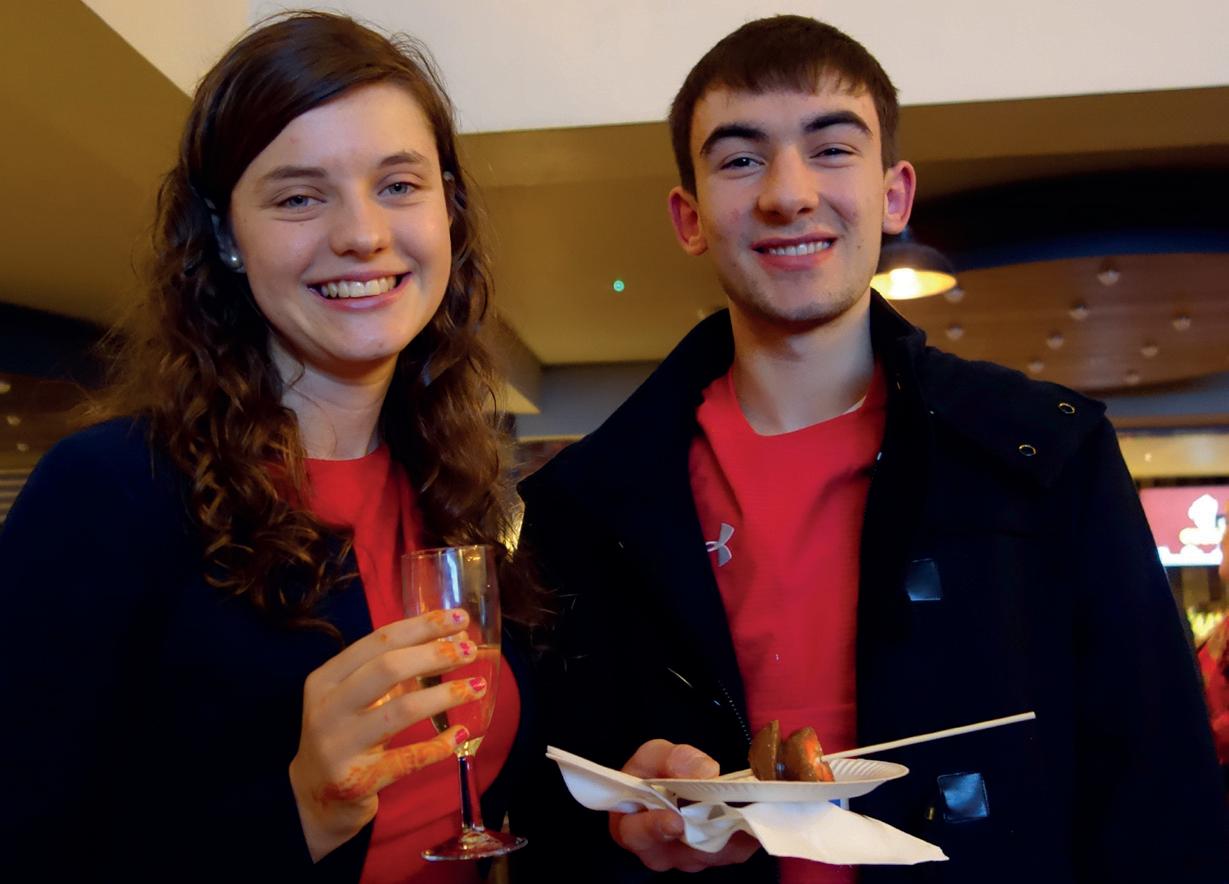
“
” They need to read the regulations and the specific details about what a design contest is
Pictured: Current and newly elected Welsh Language Officer, Steffan Bryn Jones and Claire Blakeway, current VP Heath and newly elected SU President
6 NEWS
Alexander Norton
“ ”
Pictured: Cardiff University Students’ Union
Anna Lewis
Dust settles on unprecedented £13m research funding
£1.4m goes to study of evolution of cosmic dust
Cardiff University has been awarded an unprecedented £13million in research funding from the European Union.
The sum – which is made up of four prestigious grants from the European Research Council and is unprecedented for a Welsh university - has been designated for twenty-six projects under the European Commissions’ ‘Horizon 2020’ programme.
Of the four grants, three were awarded to the School of Physics and Astronomy in order to fund research into the evolution of cosmic dust and nanodiamonds.
Notably, Dr. Olivier Williams will receive £2.2million towards his research in the field of experimental physics whilst Dr. Mark Hannam will receive £1.6million to aid his
focus on the collision of black holes.
The School of Pyschology will also receive a substantial portion of funding, with Professor Chris Chambers awarded £1.5m to better understanding of cognitive control training.
The University received the funding shortly after it announced plans to invest a £300 million research campus, nicknamed ‘SPARK’, which is to be amongst the world’s first dedicated social science research facility.
The planned campus, which is to help Cardiff University “lead the world in solving global social issues”, will be built near the existing Hadyn Ellis building on Maindy Road.
Cardiff University Vice-Chancellor, Professor Colin Riordan, said: “A
set of awards of this magnitude for Cardiff University is an outstanding example of impact in action.”
“It not only confirms our reputation as a world leading institution, but underscores the groundbreaking work being done by young researchers to advance our understanding of science and society,” he added.
Riordan explained that the funding for the twenty-six projects come from across the three sections of the Horizon programme: the ‘Excellent Science’, ‘Industrial Leadership’ and ‘Societal Challenges’ categories.
According to the Vice-Chancellor, the funding reflects the University’s growing ambitions in the field.
However, Cardiff’s aims were publically questioned in January after it was placed in the lowest cat-
egory for its global research by the Global Health Research League.
Horizon 2020 aims to strengthen the EU’s position in science and industrial leadership in innovation. The programme was launched in January and is the largest ever research funding programme involving the UK.
Welsh Government Finance Minister Jane Hutt praised the University for its achievement.
“Congratulations to Cardiff University for securing nearly £13M to take forward a range of innovative research projects that will bring real benefits to science and society.
‘Horizon 2020 presents Wales with excellent opportunities to build research excellence and enhance Wales’ reputation in the world for research and innovation.’
‘Terror’ risk at UK universities, says Cardiff Met chaplain
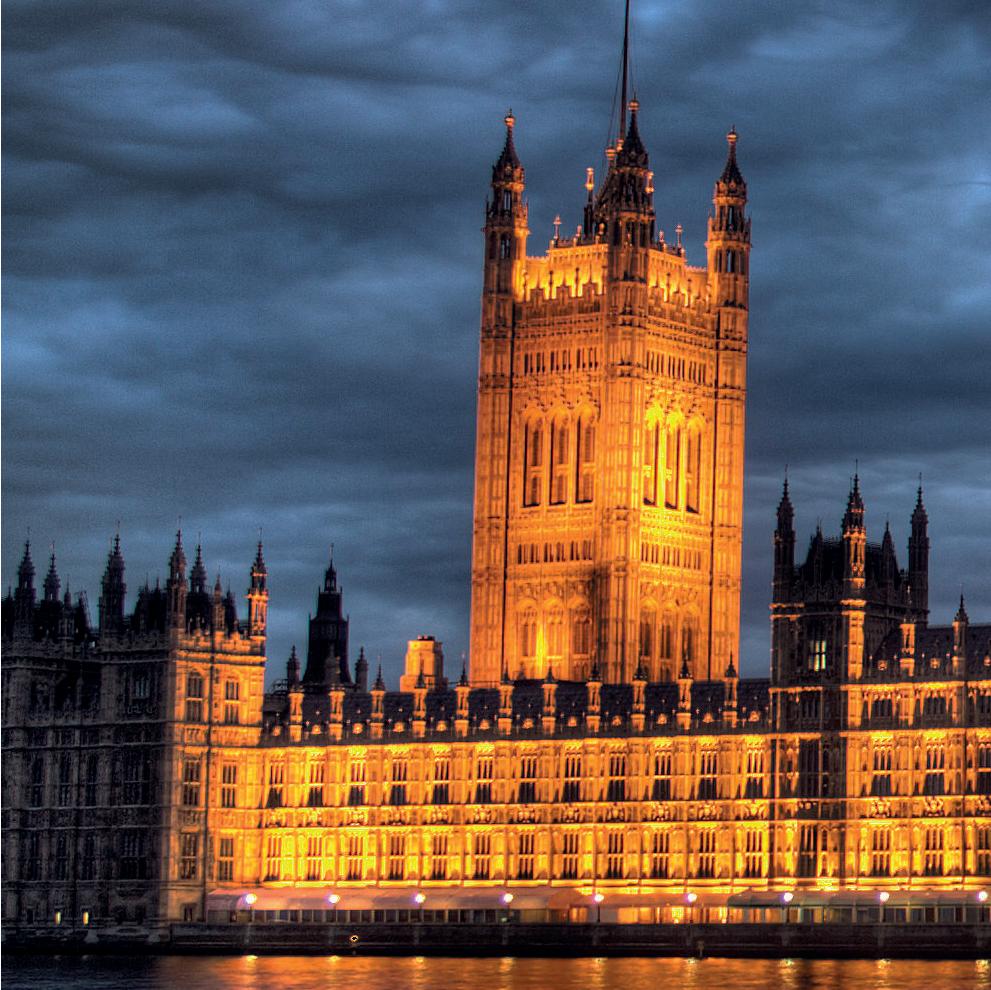


Welsh universities are faced by a ‘serious threat of radicalisation’, according to Cardiff Metropolitan’s chaplain.
Dr. Paul Fitzgerald, chaplain at the University and co-ordinator of the Prevent strategy, described university students as ‘very vulnerable’ to radicalisation.
He linked the threat to the wide number of religions found within the universities. Fitzgerald explained: ‘Particularly cultic groups will look at universities, because students are hungry, they’re dynamic, they’re looking at new concepts. That’s the whole reason they’re here but they’re very vulnerable when they do that.
‘If you get a student involved in a difficult group early on they’ll probably be embedded for a while, students attract students.’
In a controversial move, Fitzgerald labelled prayer rooms and exter-
nal speakers as ‘risk points’, in addition to ‘non-standard academia’ and online chat rooms.
Despite this, he reassured students that his comments are not aimed at any specific religions:
‘This is about groups which have the potential to harm students, it is not about a specific faith group.
‘I know everyone is talking about Islam at the minute but actually radical groups have got nothing to do with Islam.’
Fitzgerald also justified the need for the Prevent Programme to be introduced by citing the recent case of three British schoolgirls who are thought to have left the UK to travel to Syria.
However, questions have been raised over the validity of Fitzgerald’s claims as creator of the Prevent initiative, which forms part of the government’s counter-terrorism strategy. Gair Rhydd editor Michael
O’Connell-Davidson explained: “If Dr. Fitzgerald is in charge of implementing the Prevent programme then of course he is going to create the impression that his job is necessary.”
“This isn’t an impartial belief, but something that .”
Assistant secretary general of the Muslim Council of Wales Abdul Azim Ahmed, also underlined the need for political action to address the problem of radicalisation rather than action taken by chaplaincies and universities.
“Ultimately the onus is on politicians to address the political contexts in which terrorism flourishes,” he said.
According to the Prevent coordinator, the nine universities in Wales have agreed to adopt the programme as part of the government counter-terrorism strategy introduced by Theresa May.
“
A
set of awards of this magnitude is an outstanding example of impact in action
”
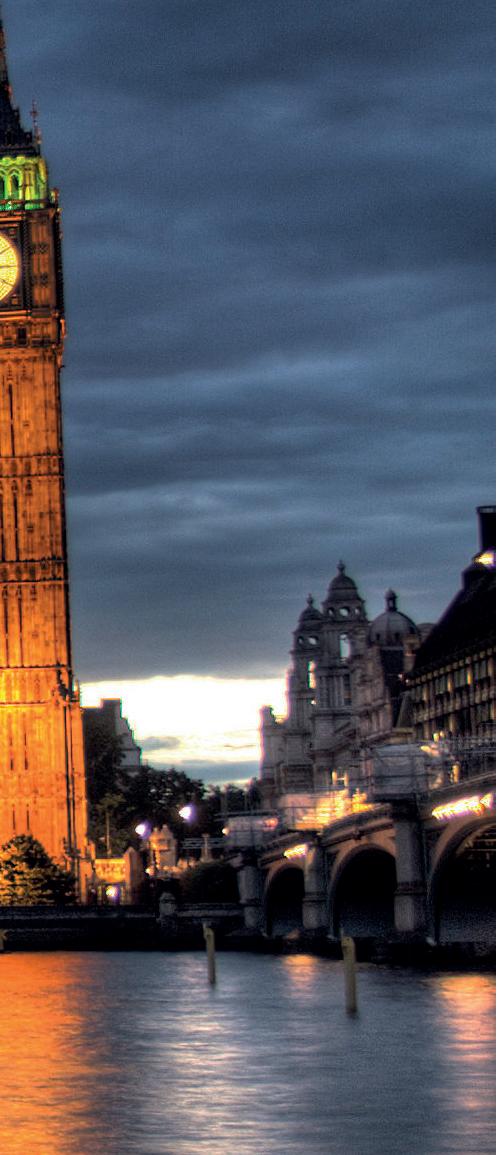
However, Cardiff Students’ Union released a statement on February 16th condemning the anti-terror legislation. In the statement the bill was condemned for legitimising ‘mass surveillance and eroding the civil liberties of people in the UK.’
The statement was issued following a motion submitted to the Student Senate by Nadine Dahan urging the Union to denounce the bill.
Defending the Prevent Programme, Fitzgerald explained that the new law was ‘not about breaching freedom of belief in any way, shape of form’ but about ‘protecting students’.
As part of the initiative, regular inspections will be conducted on campus in order to check that antiterrorism bill is being implemented. It will also see police and training packaging implemented and used as template for other universities in the UK.
Te
and Security Bill recently passed through Parliament.
“
That’s the whole reason [students] are here, but they’re very vulnerable
”
7 NEWS
Anna Lewis
Pictured:
CounterTerror
Welcome to our Advice section, where we bring you tips for surviving Cardiff university life email us: advice@gairrhydd.com
Having problems with your course and need someone to report them?
Become or use a student academic representative to help your peers with issues and shape the student experience
 Kirsty Fardell
Kirsty Fardell
Student Academic reps are elected at the start of the year by their peers in their cohort and represent them on academic issues, helping to shape your student experience.
Tere are over 1000 academic reps in all 27 schools serving as valuable links between the University, Students’ Union and the student body. Perhaps you’re thinking of becoming a rep or want to find out who the relevant rep for your course is - either way they are a very helpful and vital inside link between students and the university in a role that is very rewarding.
Te reps will hear any feedback on your university experience, positive or negative, on your school, module or subject and report them by attending the Student-Staff Panels which occur on average once a semester. Tey can also provide sources of information regarding various services in the University and SU as they have been trained to signpost students to the right places.

What do you think? Have your say: advice@ gairrhydd.com
To find out who your student academic rep is you can email studentreps@cardiff.ac.uk. Tey should also do at least one shout-out in a lecture per semester and send out emails encouraging students to get in touch with their comments.
At the Student-Staff Panels the reps meet with University staff and other reps. Tey raise the issues and comments heard from students and then a decision is made on whether they can solve the issues or if its needs to be taken higher up. Te out-
come will then be reported to you by the rep and they will keep you up to date on any advances until it has been resolved.
Te student academic reps are democratically elected by their peers during the first few weeks of term. Your school will explain how they will take place, whether in class or electronically. To find out information about how to go about putting yourself forward to become a rep, you can again emailstudentreps@cardiff.ac.uk who will let you know when the elections are taking place in your school. Rhys Jenkins, the current VP of Education can also give you further advice on becoming a rep so visit him on the 3rd floor of the Students’ Union.
Te key responsibilities of an academic rep are to collect the views of the students on your course and to report them to your school at the Student-Staff Panels, and then return to the students with concerns to give them an idea of what is being done to correct their issues.
Becoming a rep can mean that you contribute to the smooth running of your course and making a difference to the education that you’re investing a lot into. Tere are members of the University and SU staff that are dedicated to support you. Tere are also conferences, guidance and extensive training courses to ensure you’re fully equipped to make a difference.
From time to time reps may need to deal with issues of a sensitive nature that will need to be directed to
the Student Advice Team or the other support services available from the University which reps will be fully trained to detect. Tey will also need to keep your school informed of upcoming events and developments, as well as the outcome of their own issues when raised at the Student-Staff Panels. Reps also gain a wide range of invaluable transferable skills to make you more employable come graduation, and you’ll meet lots of people along the way.
The training for reps is taken by the Student Voice Team during October/November to cover the basics of representation, a rep’s main responsibilities, ways of engaging with students in your school and the types of scenarios reps may face. Each academic school has a member of staff to serve as your Student Rep Coordinator. They provide a central point of coordination in each school and support the school’s academic rep.
Student academic reps will also receive a certificate if they attend all the training and become effective reps as a recognition of their efforts. There are also awards for academic reps through the Enriching Student Life awards exclusively for reps who have made a difference to the lives of their peers and have put forward necessary changes and solutions.
Reps work with the Student Advice service and the Student Support service to direct students who need support or advice as well as the Maths support service for student
who need additional help with their maths skills.
Tey all receive an extensive guidebook for each school that will help them to advise students in the right direction with any issues they may not be able to address, as well as explaining their role and how to represent the students in their cohort.
If you would like to find out more about becoming an academic rep, or are trying to track down the person representing your school, visit http:// tinyurl.com/n9tk84 or email studentreps@cardiff.ac.uk.
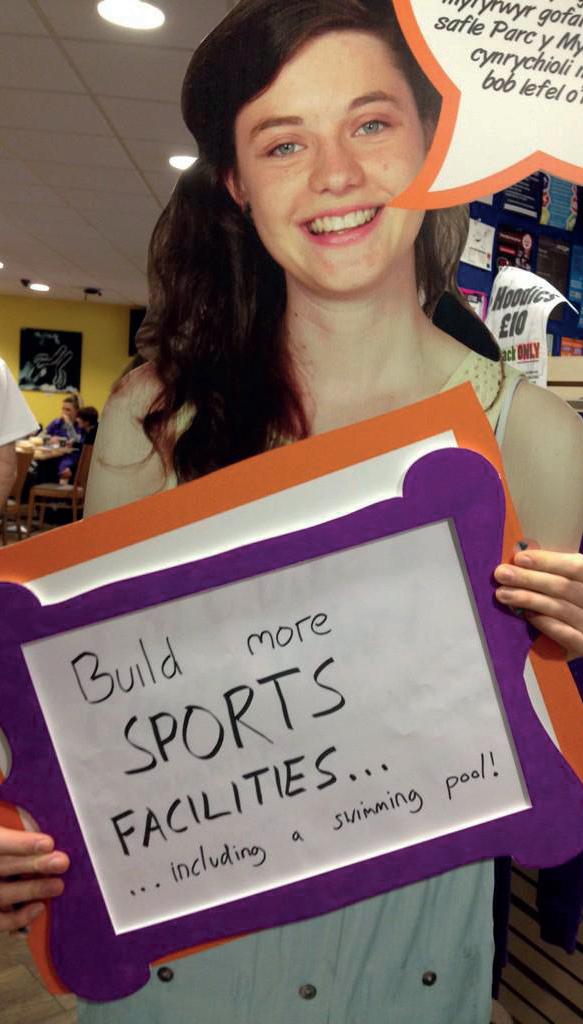
The reps are elected by their peers during the first weeks of term
ADVICE
“ ”
Pictured: A cardboard cut-out of current VP Heath Park and SU President Elect Claire Blakeway having her say during Speak Week
Pictured: Some of the student academic reps for this year

Visit their website at http://tinyurl. com/onovxlh
Know someone who deserves recognition for outstanding work?

Te
Enriching Student Life and Honour Roll awards are the perfect way to nominate deserving students and staff
There is an opportunity for students to nominate a member of staff who stand out for some reason. Perhaps you have a particularly inspiring lecturer with inventive teaching skills, or you’ve found the administration staff have been there for you during an hour of need. Maybe even a receptionist has consistently brightened your day or a member of security has looked after you.
Tere are a set of ten special awards up for grabs so nominate the staff who deserve them most. Tey will be judged by a panel made up of students, SU staff and university staff Te criteria include the level to which the student experience has been enhanced by the member of staff, the amount of students affected by the staff member and the time that the staff member has put into enhancing the student experience.
Tere are ten categories for nomination. Te award for Personal Tutor of the Year is for a personal tutor who has gone above and beyond to help their students, perhaps by going an unexpected mile to guide them through their time at university. Te Most Effective Teacher award is for a lecturer that makes even the hardest of modules easy to understand and takes extra time to explain things or adjusts their teaching styles to ensure their students fully understand.
Te Most Uplifting Staff Member award will go to a member of academic or non-academic staff who is always able to cheer you up, give encouragement and be guaranteed to put a smile on your face - even on a Monday at 9am. Te award for Employability is for an outstanding member of staff who has gone above and beyond to increase your employability with opportunities for students to improve, such as giving lectures on careers or facilitating a meeting with employers for students to talk to.
Tere is also an award for the Student Rep Coordinator of the Year, for a member of staff who has always strived to make Student-Staff Panels in their school work as effectively as possible. Perhaps they always make sure papers are ready or attendees are there on time - nominate them for this award.
Some of the categories are exclusive to students, like the Student Academic Rep of the Year. Tis award is split into three sub-categories - one for the college of Arts, Humanities and Social Science, the college of Biomedical and Life Sciences and the final one for the college of Physical and Life Sciences. Tese are for the most effective student academic rep from each college who have been excellent at representing their students, or perhaps made a great change that many people are benefitting from. Te winners of each sub-category will become the finalists for the Cardiff University Student Academic Rep of the Year award.
Te big student award is the Honour Roll award, for a student who has made an outstanding contribution to the student experience across the university. Tey have created a positive impact on their fellow students of the wider community, showing commitment, passion and motivation throughout their university life - devoting their time, effort and unequivocal commitment to a cause external to their studies and therefore created a positive impact on their fellow students or the wider community.
Perhaps they are a dedicated member of a club or society, volunteer for an external organisation or significantly contributed to the community around them. Te winner will also be chosen by trustees from the SU and
senior members of university staff Nominations for the Honour Roll close on 21st March at 5pm. To nominate someone for this award or for any of the staff awards visit http://tinyurl. com/onovxlh
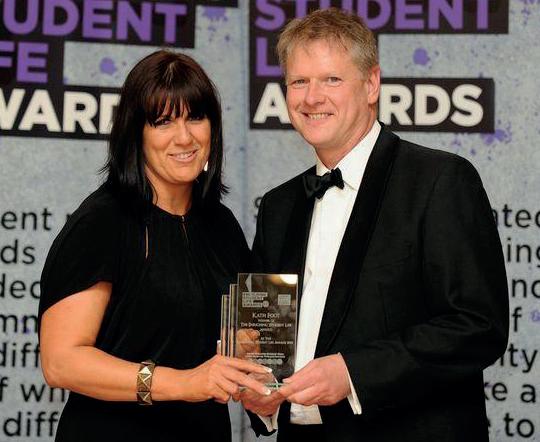

There are ten categories for nominations including awards for students and staff
9 ADVICE
“ ”
Pictured: Last year’s winner of the Enriching Student Life Award, Kath Foot
Kirsty Fardell
Pictured: Te award ceremony last year






@CardiffDP /Dominos.cardiff 62 Crwys Road, Cathays CF24 4NN 029 20 22 99 77 Opening Hours: 10am – 5am, 7 days a week 1. At regular menu price. Free pizza must be equal or lesser value than the first. Collection only. 2. From the menu or Create Your Own up to 4 toppings. Premium bases, crusts and additional toppings charged as extra. Collection or delivery. 3. Available Tuesday’s only. At regular menu price. Free pizza must be equal or lesser value than the first. Collection or delivery – delivery areas and minimum delivery spends may apply. Offer cannot be used with any other offer or promotion. Participating stores only. Subject to availability. Offer must be used at the time of ordering to apply and cannot be used retrospectively. Offer can be amended or withdrawn at any time without notice. Conditions apply see Competitions and Offers at Boring Legal Stuff at dominos.co.uk for full details. Valid for a limited time only and can be withdrawn with out notice. OUR PIZZA TRACKER LETS YOU FOLLOW YOUR ORDER ALL THE WAY TO YOUR DOOR DELIVERING UNTIL 5AM DEAL-LICIOUS COLLECTION ONLY BUY ONE GET ONE Medium & large pizzas when you collect in store, available 7 days a week! FREE1 COLLECTION OR DELIVERY 2 MEDIUM PIZZAS2 + POTATO WEDGES + GARLIC PIZZA BREAD + 1.25L BOTTLE OF COKE £19.99 Upgrade to large for £3 extra. T M COLLECTION OR DELIVERY BUY ONE GET ONE FREE Medium & large pizzas only EVERY TUESDAY 3
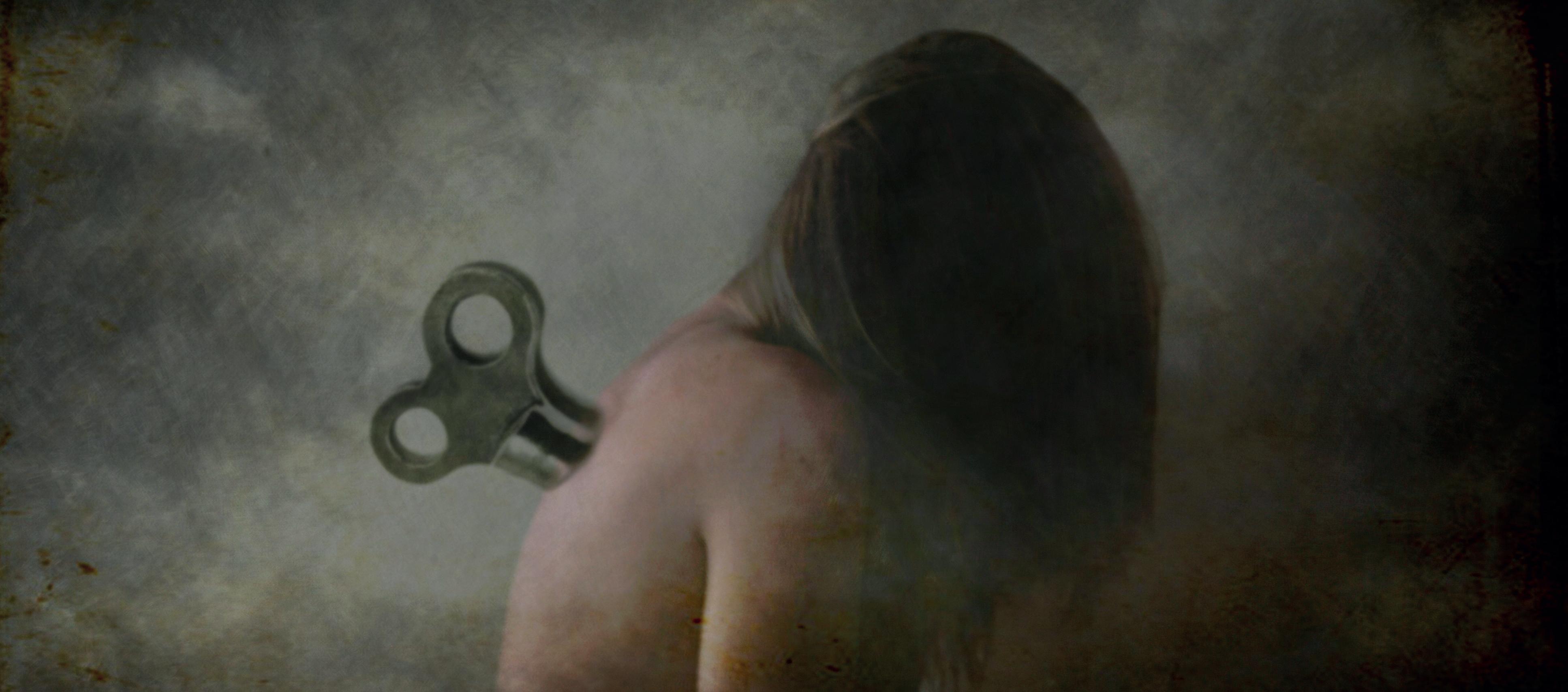
Why don’t you like me?
Caring what others think at the expense of caring for ourselves is damaging - here’s why
Mental. Uptight. Autistic. Tese are all words that have been used to describe me in my time at university. Tree years in, my life has been turned upside down. Last November I was diagnosed with depression and anxiety problems. Te black cloud that fogged up my brain, made me constantly tearful and miserable company overtook my life. Leaving bed to go to lectures became impossible, deadlines went out the window (including those for my work on this newspaper) and I became a shadow of the person that I used to be.
When I was put on antidepressants after a daunting visit to my GP, I entered a world where I found myself forced to be happy. My medication would not work unless I gave it the chance to.
We have to draw a line somewhere to ensure that people aren’t damaged by the distorted images that they see in the media
I constantly berated myself for being so pathetic. My cycle of negativity eventually led to me finding other people terrifying company. What if I disappointed them? Bored them? I had a reputation for being socially awkward, and this only increased when my depression became the elephant in the room. Leaving the house became a challenge that I faced on a daily basis. I lied to my friends about why I wanted to miss nights out – I didn’t think they’d understand that the black cloud over my mood made everything a blur, and alcohol gave me a comedown that plunged me into depths of my own mind that I didn’t know existed. I sweated constantly, my body existing in a continuous cycle of panic. My beloved caffeine made me twitch and
feel nauseous. Car horns made me jump out of my skin.
I felt like other people were constantly looking me straight in the eyes and judging me. On everything: the way my clothes fit (I’m a lanky 5’10”), the way my skin constantly glows red and how, unlike most other girls, I wear trainers with every outfit.
I had terrifying hallucinations where strangers were stood at my door, eyes glowing and staring with malice while I panicked and furiously chained my door shut.
I told a very select bunch of friends that I was being medicated for my condition and their levels of support were unbelievable. My medication, I found, gave me the energy of a kitten (shame it didn’t make me as cute as one). I was running around with endless energy that suddenly ended –a problem that only sleep could solve. When my depressive episodes became so bad that I wanted to end my life, I reached out to my housemate and texted her the words that I couldn’t say out loud. I told her the reasons that I refused to come downstairs and socialise. She told me that she would do anything she could to help me – thank you for saving my life, Liv. Speaking now, when my depression comes and goes, these thoughts seem completely ridiculous. But when I am at my worst, life becomes a terrifying concept.
Soon I started to wonder where my anxiety stemmed from. I wondered why I thought people noticed everything about me. Mindlessly staring at my TV one night while my housemates watched ‘Britain’s Next
Top Model’ (my depression makes concentrating almost impossible at times), I noticed what my housemates were saying about the contestants. Comments on the contestants’ bodies were explicit, everything from their hair to their accents scrutinised. Why does the media insist on producing shows explicitly made to judge others?
We judge other people’s ‘relationships’ in addictive, ‘highquality’, shows like ‘Made in Chelsea’ and ‘Te Only Way in Essex’, and Britain’s love for soaps makes drama in other peoples’ lives fixating.
Magazines provide us with airbrushed men and women that distort our perceptions of reality. Duchess of Cambridge Kate Middleton sprouted a few grey hairs and tied her hair in a ponytail and it became breaking news. Non-altered photos are seen as something to report ‘OMG! NON RETOUCHED PHOTO APPEARS!’ - not an everyday occurrence. Some people still believe everything they read. We have to draw a line somewhere to ensure that people aren’t damaged by the distorted images that they see in the media.
Growing up, I was surrounded by chronic illness in my home environment (I know, woe is me). One of my siblings sought control in the world that she believed was out to get her, through an eating disorder, while the other couldn’t be fully integrated into this world when she became bedbound. I was cruelly nicknamed ‘the normal one’ by my family. But I found planet normal to be a very disturbing place. People got a thrill
out of judging one another, spying on each other and pretending to be someone who they really weren’t.
Growing up quicker than most people did, due to my hidden circumstances at home, ensured that I wasn’t totally naïve when I came to university. I soon learnt that people are inherently two faced. Tis is no insult to anybody I have met, but what I see as the truth. Sociologist Erving Goffman wrote about the presence of the ‘back stage’ and ‘front stage’ in our personalities. We perform some actions to some individuals, while only some see the true feelings and thoughts that we do not portray to others. I constantly saw this at university – and the people who tried to impress others by constantly acting out of character soon faltered and showed their true colours.
Te most influential people on my life at university aren’t necessarily the ones I’m closest to or have the strongest relationship with. Instead, they are the ones I have identified that do as they please – without feeling the need to impress other people or change themselves for anyone. I cannot stress how admirable I find this.
So my battle with anxiety and depression continues. My mood yo-yos on a daily basis, sometimes being terrifyingly low and sometimes happiness overwhelms me, and I know how lucky I am to have such a strong support network around me. But society can do a better job to ensure that it doesn’t create individuals that live for the thrill of judging others. So let’s help it along the way.
Depression controls you and puts you under a black cloud.
I soon learnt that people are inherently two faced
11 COMMENT
Anne Porter
Pictured:
(Source: Mary Lock, Flickr)
“ ”
“ ”
van den BentKelly
Rape isn’t a by-product of India’s culture war
What has India learnt from the rape and murder of a student in 2012? Not much in all honesty. One of the men who was involved - Mukesh Singh, has shown no remorse and is somewhat puzzled by the outrage and shock it caused. To him, it certainly doesn't merit the death penalty that has been awarded to him. What these remarks have resulted in is article after article attempting to answer the question why.
Why is the rape situation in India so bad? Why are individuals so nonchalant about rape? And then come the explanations - in an effort to perhaps humanise the event and allow an understanding as to why this attitude exists. And the most prolific answer seems to be that India is undergoing
a culture war - a battle between rural, traditional views and the modern, 'the sky's the limit for everyone' outlook. But the 2012 rape case isn't an issue of the culture war raging in India. What excuse is that? How is that a justification?
Unfortunately, rape isn’t just exclusive to Asia, so such statements make no sense. Take Manchester for example. It had over thirty reported student rapes between last September and December. What culture war is occurring there? Te last time Manchester experienced any sort of culture revolution was in its music scene during the 80s and 90s. Rape is as much a by-product of urbanisation in the Indian sub continent as the industrialisation of the North of England. But the issue is that many Brit-
ish people will be unaware of what is practically an endemic in Manchester. So how can this be tackled? Because this justification and lack of remorse doesn't just have residence in India - it clearly is fully alive in the UK, and Manchester isn't the only city it occurs in. What attempting to explain why people are justifying the rapes does is isolate to another continent. It distances us from the real problem and will merely make many people simply shake their heads at the news headlines in disapproval - before forgetting about the problem. Tat shouldn't be happening. Te outrageous statements made by the rapist should inject a passion into individuals to tackle the issue here. To highlight that yes, there should be a proactive approach to stopping rape.
Tat's what happened in Manchester. Over two thousand people attended their 'Reclaim the Night' and the reasoning for that is obvious. It is a direct response to the situation that hit their city. I don't have the answer - not for India, Manchester or even Cardiff. But there needs to be a reflection on how rape is stopped, how it can be prevented. Instead of simply reporting and stating my opinion, I need to convey a better understanding of what's occurring. Tis Comment section should serve as more than just a platform for me to criticise what Singh said. But actually emphasis what we already know, there is no culture war that is influencing such behaviour. It is simply power, control and a complete lack of boundaries.

Labour’s tuition fee pledge won’t pay off
Lowering tuition fees to £6000 by 2016 just won’t save Labour - here’s why
Louis
Urruty
Last week, Ed Miliband announced that his government would cut tuition fees from £9000 to £6000. This is a move born out of political opportunism rather than a genuine desire to help students. It is reflective of a wider misunderstanding of the tuition debate that fails to take the real interests of students into account.
Discussion around tuition fees has had the wrong focus. It needs to shift away from total fees, and towards living support, the maintenance loan, and the process of paying it back. The number one

cause of students dropping out of university is financial hardship. It is not an inability to pay back debt after graduation, but an inability to pay rent and living costs during their studies. This is when students are most in need of financial assistance. After all, we cannot work full-time and, if we do work, we are entitled to a lesser minimum wage. Moreover, there is no evidence that the increase in fees has led to less students attending University. Rather, university applications are at a record high, and applications from people from disadvantaged backgrounds have soared. Evidently tuition costs are not the main cause for concern.These fees not being paid up front means that they’re not really the problem. We only pay them back once we’re in a position to do so. And the threshold at
which loans are paid back is now at £21,000 instead of £15,000, meaning it really is the case that the money is paid by those who can afford it. That is the hallmark of a progressive tax system.
The suggestion from Labour is that cutting tuition by a third will reach out to the many disengaged young people across the country. While it is true that the young are neglected in political discourse, this shallow attempt to win over younger voters represents this very neglect. It shows an unwillingness to engage with the real issues facing students, a lack of understanding around student affairs, and a patronising ‘carrot-and-stick’ mentality when it comes to policy.
Do they really believe that this is enough to persuade students to tick their box?
“ ”Manchester had over thirty reported student rapes between last September and December
COMMENT tweet us @gairrhyddcomment email us comment@gairrhydd.com or visit us online at gairrhydd.com/comment
Olivier
Pictured: Te false promise by Labour Source: @ SNPStudents, Twitter
Pictured: Indian demonstrators with placards, in response to the December 2012 New Delhi rape (Source: AFP / Tengku Bahar)
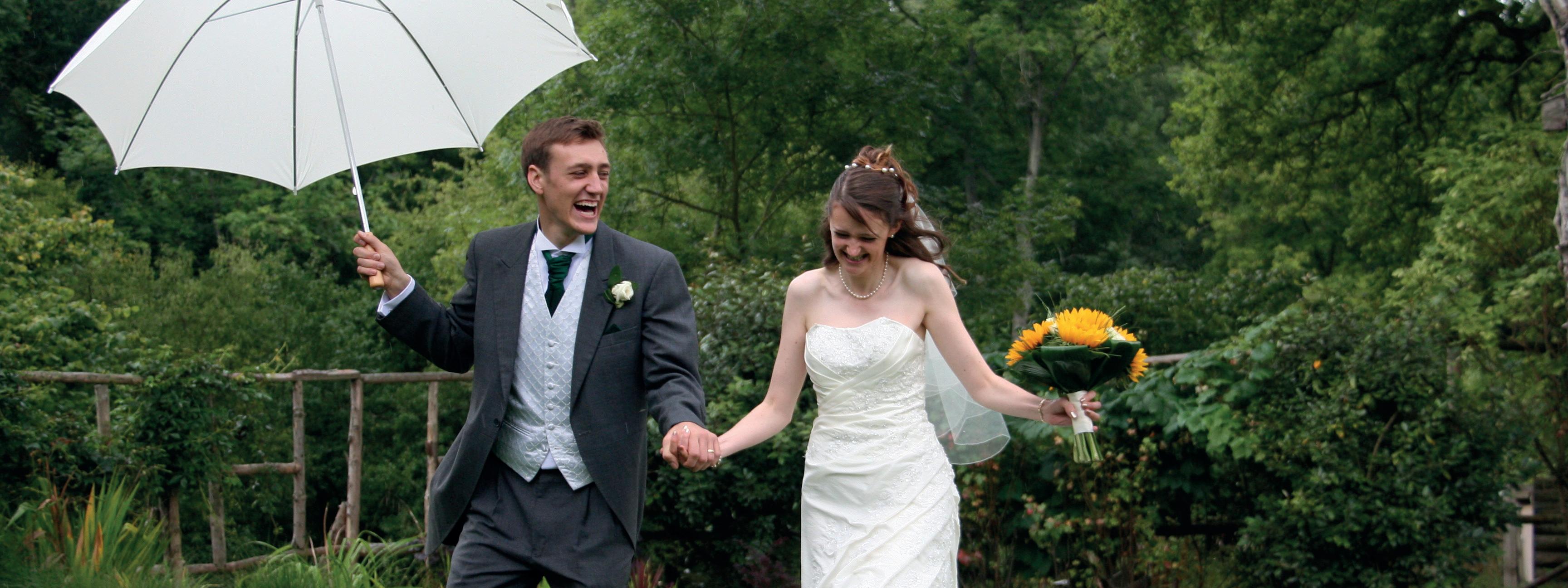
Put a ring on it
Are negative perceptions of marriage at university justified?
Vidya Brainerd
“Oh my God you’re so young, what’s the rush?” or “Are you pregnant?” are just two of the many questions my fiancé and I have been asked when we’ve told people that we’re engaged. How crazy is that? Are my fiancé and I simply not allowed to be engaged because we love each other unconditionally, and we know we want to spend the rest of our lives together? Is that not a thing anymore? When I got engaged back in November 2014, I was 21 and my fiancé was 22. A year on, I’d like to think, even though I’m ‘fairly young’ in the eyes of current society to commit myself to someone, I have fully matured and grown. After all, age is just a number. I don’t think there is anything drastic left to change about me; my morals, my beliefs and who I am are pretty much completely formed. However, if I were to grow further, I’d like to think that would be ok too because isn’t a marriage vow all about loving and supporting each other through all of life’s changes?
Not all of us want to jump from relationship to relationship or have casual sex with random people. I am a little too neurotic and insecure for that game
Now is probably a good time to tell you a little bit about my fiancé; maybe this way, most of you will understand why I am ready to commit my life to this guy. I do have doubts sometimes. My fiancé is called Sayijan, and I met him in London just over four years ago. However, we didn’t start dating until two and a bit years ago. He’s everything that other guys just weren’t. He’s not a creep, not a player, not a liar, not a loser and not a commitment-phobe. With other guys I’ve dated though, I do want to point out, I wasn’t aware of all these less desirable qualities at first.
Over the last few years, when I have talked about finding a life partner, people often respond with with “Girl, you’re too young to settle down” or “Just have fun, you can get away with all sorts when you’re young”. Not all of us want to jump
from relationship to relationship or have casual sex with random people.
I am a little too neurotic and insecure for that game. I’d rather spend my days searching for someone to be my partner in life, to share life’s wonders with, to have babies with (yes, I would like that, but in a couple years after we get married would be nice) and finally, to enjoy the security of a relationship that has permanence. A lot of people shudder at the thought of those things - sharing, permanence and family. I don’t, and this is why, when I found Sayijan, I kept him.
Saying ‘yes’ to Sayijan felt right (in fact, I think I had imagined this moment for a few months and had already practised my answer), and the beautiful ring was just the icing on the cake. Being engaged now feels so right. We have never had pressure from friends, family or anyone else to get engaged, we have just taken each day as it comes. We have spent most of our relationship living together, with others (for all you traditional people out there), cooking for each other and cleaning together. From the beginning of our relationship, our parents and close family have been in the loop and have thoroughly enjoyed being part of this journey with ussomething I never had a chance to do in other relationships. Tey have supported us in whatever way we have needed and have always been on hand to give us advice. Of course, like any couple, we have had our fair share of fights, but that has only made us stronger.
Another reason why I am so ready to marry Sayijan is during the toughest few years of my life is that his presence and support has not wavered. As most of you may know, through my role as Students’ with Disabilities Officer, I suffer from many things including severe depression and irritable bowel syndrome. Tose
two diseases are ones which really can test the strength of a relationship. Many times, he has watched me selfharm, collapse and break-down due to my depression, as well as having to come to the toilet with me if my irritable bowel syndrome is really bad and I feel nauseous. He’s held my hair while bent over a sink and also hugged me so tight when I felt like life wasn’t worth living anymore. He’s supported me, stood by me and celebrated all my achievements as though they were his own. I don’t think it’s possible for me to find anyone else in this world, apart from my parents of course, who would go so far as to sacrifice their life for me if they had to. His final year at the University of Hull was mostly spent in Cardiff looking after me and making sure I was okay. He’d cook for me, stay up with me and take me to counselling. Admittedly, as a result, his final degree mark wasn’t a reflection of what he’s capable of, but he never once blamed me. He picked himself up, applied to Cardiff and has just completed his MSc and achieved a merit.
Tere seems to be a lot of controversy about getting engaged and married at a young age in the media. We live in a society where choice is paramount and we are afraid to settle on one thing or on one person, as we are led to believe that something better is always waiting around the corner. We are bombarded with options in all areas of life and can feel uncomfortable sticking with one thing for fear of ‘settling’. But, making a decision that affects the rest of our lives isn’t something we should be afraid of, but is a sign of maturity. It is something which we should embrace and throw ourselves into. Committing to one person is exciting, and far from feeling like the choice constrains you or takes away your freedom, this decision actually feels like you are taking control of your life. Admittedly, getting engaged or married young is not for everyone, but for me, I’m engaged at university, and it’s exactly where I feel I should be right now.

Pictured: Marriage remains the right way for some - but is it too much too young at university?
(Source: Jimmy and Sasha Reade, Flickr)
We are bombarded with options in all areas of life and can feel uncomfortable sticking with one thing for fear of ‘settling’
”
13 COMMENT “
“ ”
JASON ROBERTS VS THE WORLD


Teacher training Bad lecturers, I see you.
Jason Roberts
Doing a degree is hard. You have to learn new things quickly, read long texts that are often both complex and poorly written beyond all comprehension, all the while nursing a hangover that’d kill lesser human beings. Lecturers then, can either make things a great deal easier for you, or a great deal harder. The good ones are talked about in reverential terms, toasted to in the Woodville, and drunk-emailed incoherent thanks on graduation day. The bad ones? Not so much.
If you have something interesting to say, people will trek through the freezing Welsh rain to hear you say it. If you don’t, they’ll stay in bed and watch TOWIE repeats
When you think about it, your relationship at university with your lecturers is generally a weird, strange coexistence. It all starts on your first day, when you realise that you can call them by their first name. You didn’t call teachers at school by their first name unless they were subs, in which case you just called them whatever you wanted anyway.
But lecturers aren’t teachers; often they’re the total opposite. You sort of get the feeling that for some lecturers, teaching is an ordeal that they have to endure every term, just so they can continue their research into how and why frogs masturbate or whatever. They’re lecturers in spite of the fact that they have to lecture, rather than because of it.
This can be a bit difficult to comprehend. When you consider that you’re going to have to sell your
organs to repay the tuition fees the university ask of you, you’d think it at least reasonable that the university provide you with lecturers that actually enjoy turning up to work. Obviously, this isn’t the case for all of them. Some of them are good, and some of them are great. But it remains frustrating when you come to choose modules, and you choose to forgo a topic that you might enjoy because the person teaching it has no interest in their subject, or you.
Sometimes, I feel that lecturers need a hand in knowing how to appeal to students. Sure, they hand out feedback forms at the end of modules, but students put about as much thought into those as they do into the possibility of liver cirrhosis in later life. No, I feel that lecturers need a broad guide in how to make sure that students feel like they’re getting the most value for money and enjoyment out of their course. Conveniently though, that’s what you’re reading right now.
The first and most important thing you should remember is this: just because you’re a good academic, doesn’t necessarily mean that you’re a good lecturer. You might be the world’s foremost authority on rectal cancer in dormice, but if you can’t communicate it effectively to people, your existence is pointless. Time after time I’ve sat in a lecture while a stuttering, sweaty mess of a human
stands in front of me, only speaking in mumbles and shit jokes. Lecturers like this know who they are, because they’re always the ones who end up putting the entire transcript of their lecture on their PowerPoint slides. This is both boring and lazy, almost to the point of being offensive.
On the subject of communication, if I email you, I’d like an answer back within three days. I mean, I don’t think that’s unreasonable? In my experience most lecturers are actually pretty good in this regard, but there are some that either wait a week or two to answer a single question, that by that time no longer matters. Or worse, some just flat out ignore you. If you don’t engage with students, you’ll find students unwilling to engage with you.
One sure-fire way to get students disengaged is to not put your slides on Learning Central. Apparently, this is something that still happens. I say apparently; I’ve never personally experienced this, because none of my lecturers are barbarous monsters. The lecturer who does this does so using the logic, “If I don’t make my lectures accessible, people will show up more often!” That, unfortunately, is horseshit. If you have something interesting to say, people will trek through the freezing Welsh rain to hear you say it. If you don’t, they’ll stay in bed and watch TOWIE repeats. How you make your con-
tent interesting is up to you, but by not making lecture slides available, all you’re doing is jeopardising the grades and futures of students because you don’t think you’re a lecturer worth listening to.
Finally, please don’t plug your books in lectures. I get it, times are hard, and everyone’s gotta eat. The rule here is: it’s fine to have them on the reading list, but if you try to hawk them to us in lectures, you’re only going to come off looking like a greedy egomaniac. They should be in the damn library anyway; I’ll have a look there before I decide to buy your 6,000-page opus on the various types of sand found in Saudi Arabia.
The thing is, some lecturers get all this. Good lecturers understand that their students are there because they want to learn, and that they are there to help them as best they can. Good lecturers know how to make the dullest content imaginable seem enjoyable and interesting. Good lecturers are constantly finding new ways to provide a better learning experience to students. I’ve been lucky enough to have some very good ones at Cardiff, but others haven’t been afforded the same luxury. And that’s a shame, because they’re the ones that’ll suffer when it comes to the job hunt, rather than their lecturer who stood in an empty theatre with all their text on one slide, still gainfully employed by the university.
Just because you’re a good academic, doesn’t necessarily mean that you’re a good lecturer
15
“ ”
Pictured: Jack Black, delivering a lecture on biosciences
“ ”






Terms and conditions apply. Endsleigh Insurance Services Limited is authorised and regulated by the Financial Conduct Authority. This can be checked on the Financial Services Register by visiting its website www.fca.org.uk/register Endsleigh Insurance Services Limited, Company No.856706 registered in England at Shurdington Road, Cheltenham Spa, Gloucestershire GL51 4UE. Take the quiz for your chance to win a month’s rent for you and your housemates. Visit: hub.endsleigh.co.uk/housematequiz Insurance recommended by
POLITICS
tweet us @GairRhyddPol mail us politics@gairrhydd.com or visit us online at gairrhydd.com/politics
What Nemtsov’s murder means for Russia

In a country where the patriarchal figure of Vladimir Putin dominates society, the death of a leading political opponent and critic of Russian actions in Ukraine is a stark warning to those who attempt to turn the tide against the President.
Boris Nemtsov had long been a critic of Putin. He was also detained for 15 days back in 2011 following the protest marches that overshadowed the murky Duma elections.
Nemstov was shot within sight of the Kremlin, in what is supposedly the most tightly guarded spot in the whole of Russia. However, according to the security services, the cameras were then facing the ‘wrong way’. Tis shooting is a clear statement to those who oppose the President.
Teories on who killed Boris Nemtsov abound. Although there is a precedent for the Russian secret service carrying out political killings, Putin claims that the state has been discredited by the killings, therefore
could not be responsible. Battle hardened fighters who have returned from Ukraine who wished to silence Nemtsov’s opposition to the conflict, have been accused, as have liberals. Te president of Chechnya blamed western spy agencies. Some even blamed his love life: Nemtsov was last seen with a Ukranian model.
Tis is not the first high profile political casualty under the Presidency of Vladimir Putin. Te difficult task for the Russian opposition now is to quickly find a new figurehead who is capable of generating the same level of momentum that Nemtsov produced in recent weeks, which included marches against the annexation of the Crimea and Russian involvement in eastern Ukraine.
Boris Nemtsov was a symbol for liberalism in Russia, but a climate of fear stops many from voicing opposition to Putin. Tis is despite there being a number of leading oppositionfigures that have been around for

many years, including ex-prime minister Mikhail Kasyanov.
Russia itself is enduring severe economic issues and, although many are aware of corruption, the public has no power to prevent it. Terefore, with another key player out of the picture, and despite Putin’s apparent quest to catch the perpetrators, life may have been made easier for those in the Kremlin.
Tere are a couple of notable exoligarchs and politicians who believe in Russia adopting a more pro-European stamce, but in a country which craves stability after the collapse of the Soviet Union any opposition to Putin’s tyrannical methods and antiWestern propaganda will need a large public backing in order to recapture and continue the atmosphere stirred by the former Deputy Prime Minister.
Tere have also been reports of political opponents from inside and outside of Russia being stopped from attending Nemtsov’s funeral. Te
Kremlin is aiming to nip the situation in the bud as soon as possible and quell any negative feelings that may be arising in the country. If successful in doing so, they will no doubt push on in exerting further influence in Ukraine as well as other ex-Soviet bloc countries who have felt Russian presence already. For example Estonia where pro Russian groups have begun to make an impact in recent parliamentary elections. For ordinary Russian citizens, this will probably mean the maintenance of the status quo. Tis will include continued corruption in key institutions, attempts to distract the population from economic problems by further interference in neighbouring states as well as quashing any possible demands for reform and greater transparency.
A political scientist from the University of Wisconsin fears that the Kremlin’s response may act as a signal that terror is acceptable and lead to political violence.
Is nepotism undermining UK democracy?
Battle hardened fighters who have returned from Ukraine who wished to silence Nemtsov’s opposition to the conflict have been accused
Sarah Hazelwood
With the General Election coming up, it may be worth looking at the family tree of your local representative. It turns out that one in twelve MPs is related to a current or a former MP. Tree MPs are even the third generation in their family to take a seat in Parliament (Labour’s Hilary Benn and Conservative MPs Nicholas Soames and Nick Hurd).
Tere are many reasons why the children of political families are more advantaged than other candidates. Te main explanation suggested by Te Institute for Government that the cost of campaigning can be up to
£41,000 over a four year period.
Tis means that most importantly these relatives have already ingratiated themselves with a party. Tey already know the system in which Westminster works and have political contacts as backers for their campaigns. Tis is reinforced by the fact that many of the relatives become part of the same party as their predecessors and would be able to forge contacts and alliances from an early age.
With this sort of advantage in campaigning and the capital needed in order to run to be an MP, it would be harder for someone from a more disadvantaged background to succeed
in a campaign to take a seat in parliament, especially if they were running against someone from a political background. Tis leads to a system that favours nepotism as it requires alliances and contacts and favours candidates with affluent backgrounds.
It can be seen as important to think about this in the terms of social mobility. Research has shown that we in Britain have the lowest social mobility in the developed world, as most earnings are a reflection of our parents’ earnings.
Terefore, we have majority of the population who do not have the same background as the people who are
running for parliament.
With this in mind we have a group of families who have dominated politics and are discussing issues within parliament that are supposed to be important to the country.
Tere is a question of whether these people can be representative of working and middle class people and their issues, as the Labour party claims to be, if their representative comes from an affluent and advantaged background.
What is needed are people from different backgrounds that are more able to represent constituents from these varied backgrounds.
“
” the cost of campaigning can be up to £41,000 over a four year period
Pictured: Boris Nemtsov’s memorial (Source: Flickr, tvoe)
“ ”
Peter Budd
Michael Arnott
Labour promises to reduce tuition fees to £6,000
The Labour leader Ed Miliband has announced that his party will cut tuition fees to £6,000 if they win the next general election.
Te drop in fees, from the current level of £9,000, would come into effect from autumn 2016. Te money to fund this shift would be gleaned from a reduction in pension tax relief for the wealthy. At the same time, there would also be an increase of £400 per year to non-repayable grants, to cover the living costs of students from families earning less than £42,000 a year.
Miliband promised that the move would benefit the economy as a whole as well as students, claiming that the burden on taxpayers caused by tuition fees would be reduced by £40bn by 2030. He also attacked the coalition for raising fees to their current level, arguing that that change had been a “betrayal of an entire generation”.
However, the coalition partners were quick to defend their policy, with the Chancellor George Osborne saying “Ed Miliband’s sums don’t add up because the universities would get less money” Te Lib Dem Business Secretary Vince Cable went further, calling Labour’s plan ‘financially illiterate’ and ‘fraudulent’
Te coalition partners raised tuition fees to £9,000 a year in 2010, from their previous highest rate of £3,290. Labour initially brought in university tuition fees in 1998. Te rise to £9,000 caused widespread protests from the student population, and much of the blame was laid at the door of the Liberal Democrats, who had pledged to oppose a raise.
Te current system, which affected students from the academic year 2012-13 onwards, requires students to pay back the government loans which pay for their tuition fees once they start earning £21,000 a year.
Tese repayments are at a rate of 9% a year, whilst any debt not repaid within 30 years is written off
Labour’s pledge appears to be aimed at securing the student vote, which could have a big effect at this year’s election. A recent study by the Higher Education Policy Institute (HEPI) says that the student vote could be crucial in deciding the result of 10 close constituencies. Furthermore, they found that the key issue for student voters is tuition fees, which suggests that this debate will be a big part of the General Election build-up.
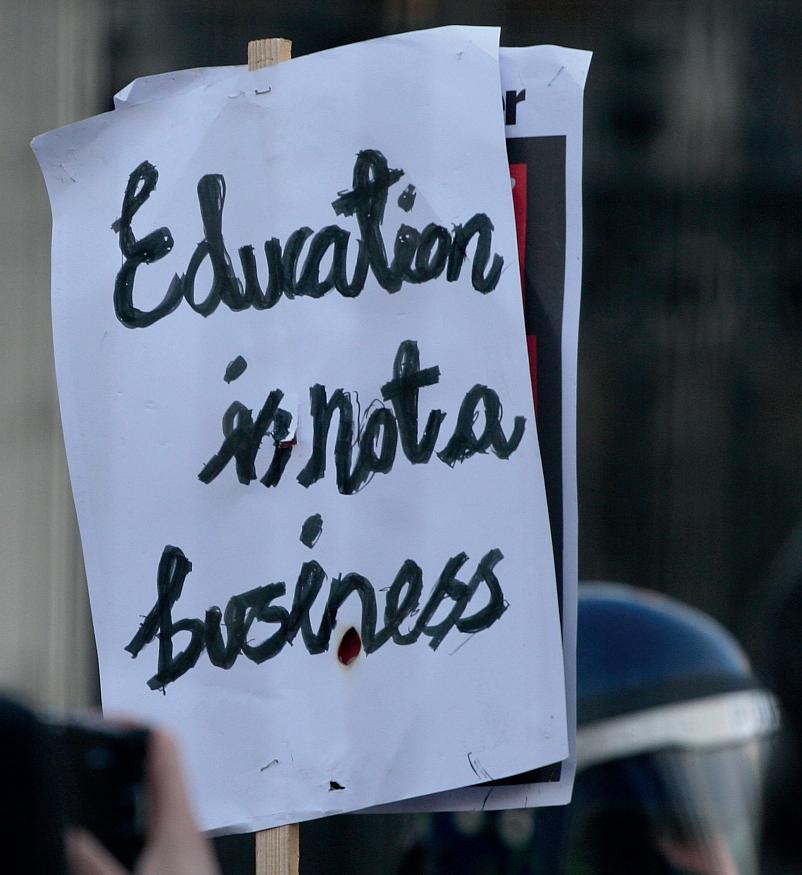
Te great train robbery
Why it’s time to renationalise rail
Rail privatisation has been a disaster. Public expenditure has doubled to £4bn a year since privatisation Ticket prices have increased above inflation and are now the most expensive in Europe including the many European countries with over 80% nationally owned rail networks. Te government commissioned McNulty report found that the higher prices didn’t mean better service.
Tories would prefer nationalised rail.
Rail accidents in 1997, 1999 and 2000, which left 42 people dead, undermined confidence in Railtrack and led to it being replaced by Network Rail
Reality is not on the side of rail privatisation supporters. Te publicly owned East Coast has returned £1bn worth of profits to the taxpayer since it was privatised in 2009, while the privately owned rail franchises require £1.2bn worth of subsidies a year. Unfortunately a 1993 law prevents long term public management of rail services. Weirdly enough it doesn’t prevent rail services from being state run so long as the state in question is not the UK: three quarters of our rail franchises are owned by either state run or government backed rail companies from Europe. Te private company Railtrack failed to properly maintain safe rail track, which, as you can tell from the company’s name, was pretty much its only job; rail accidents in 1997, 1999 and 2000, which left 42 people dead, undermined confidence in Railtrack and led to it being replaced be Network Rail in 2002. Unsurprisingly, 66% think the railways should be publicly run. Even 52% of
If you don’t want to spend a four hour journey standing up or put up with surprise unannounced train cancellations you could always drive; this seems to be what the government want. Car lovers may see nothing wrong with that, and people must really love cars, otherwise they surely wouldn’t put up with Jeremy Clarkson on their television screens. However, 20% of UK carbon emissions in 2010 came from transport, so climate friendly public transport use needs to be encouraged. Research suggests that 40 % of car journeys could already be made on foot, by bicycle or public transport, 40 percent could be replaced by bicycle or public transport if improvements were made and only 20 percent would have to continue to be made by car.
Public transport has not been made much more appealing and it is drivers and travelling businesspeople that big infrastructure plans currently cater for. Cameron is emulating Margaret Tatcher’s ‘roads for prosperity’ scheme and has promised to spend £15bn on roads. Unfortunately road widening induces demand ie. instead of reducing congestion more people attempt to use the road.
For many people driving isn’t an alternative anyway. When a child who travels to school by train reaches the age of 16 they must pay for an undiscounted adult pass because the young




person’s railcard cannot be used to buy season tickets. A worker on an average salary (£27,200 a year) would spend 17% of their income on commuting from Brighton to London. Taking a week off work after their ticket expired to go abroad could actually save such a person money on travel: £88 a week travelling to work, compared to £56 for a return flight to Reykjavik.
Michael Dugher, the shadow rail minister, promises, “the public sector will be running sections of our rail network”. Te Greens and Plaid Cym-
£1.2bn

Yearly subsidy to private rail companies
ru also support rail nationalisation. Te SNP made the decidedly un-Scottish Nationalist move of awarding a £6bn ScotRail franchise to a company owned by the Dutch state. Sometimes the market offers us no real choices and the democratic system is the only way to demonstrate our preferences. All but two private rail franchises expire in the next parliament so nationalisation is a genuine option.
17 POLITICS
“
” Miliband accused the coalition of betraying an entire generation
Pictured: 2010 student protests in London.
”
(Source: Flickr, bobalicious)
“
Pictured: Waterloo (Source: Flickr, hectate1)
Lauren Boyd
Robert Thomas
Devolution in Wales: Where do the parties stand?
Ron Davies, former Welsh Secretary and the ‘architect of devolution’ in Wales, once said that “devolution is a process and not an event”: over fifteen years have passed since the inception of a devolved government in Wales, whilst argument over its future still ignite passions. We have recently seen the unveiling of the ‘St. David’s Day agreement’ in which the coalition government’s version of the Scottish ‘vow’ in Wales was put forward.
Late February saw the latest of the spring conferences in Wales. Over three hundred delegates descended on Cardiff ’s SWALEC Stadium for the largest Welsh Conservative conference ever held, whilst the Liberal Democrats were at Cardiff Metropolitan University for theirs. Unsurprisingly, the most discussed issues surrounded the NHS, education in Wales and how the Labour party’s
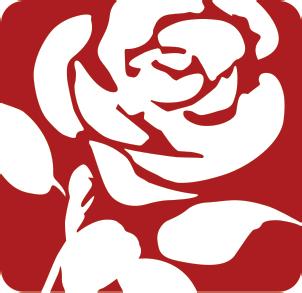
Official Labour Party position on Welsh devolution has been marked by scepticism on one hand and progression on the other. Its significance has waxed and waned as a party commitment since its establishment. In the assembly’s first fi xed term, former First Minister Rhodri Morgan called for “clear red water” between the party in Wales






Perhaps the most visible symbol of the devolutionary journey in Wales has been the fortune of the Party of Wales. Historically, when the party has done well, the argument for devolution has been strongest. Although the 1979 and 1997 referenda were delivered by Labour governments in Westminster, the former was perhaps a reaction to the growing call for Welsh independence and the
In many ways, the history of early calls for devolution, or ‘homerule’ for Wales, is written in the history of the Liberal Party itself. Rooted in the cultural-linguistic aims of Cymru Fydd in the early twentieth century, Liberals in Wales have always been sympathetic to devolution as a process of

Tory policy towards devolution has seldom been proactive or even positive. Traditionally opposed to the very notion of handing power to the regions, the party has recently embraced the benefits of more de-centralised governance.
Te Welsh Conservative Party encapsulates perhaps a less Anglo-
record has ‘failed the nation’. Te ‘war on Wales’ espoused by David Cameron last year seems to be over, as the Prime Minister gave a rousing speech declaring the Conservatives were now the real ‘Party of Wales’. Kirsty Williams’ message was of the Lib Dems being the mediating force in Westminster, reigning Labour from the left and economic mismanagement, and reigning the Tories from the right and unfair spending cuts.
Talk about devolution was rather lacklustre, speakers in both conferences hailed the ‘St. David’s Day agreement’ as the next best step in the devolution process. In their conference this month, Plaid Cymru are expected to reiterate Leanne Wood’s message that there is no good reason as to why Wales should accept third rate devolution, that the agreement: “Falls well short of the powers that can help us strengthen our communi-
and Westminster: their ideas on devolution have never been similarly coherent. Like Plaid Cymru, Welsh Labour have recently focussed on the Barnett formula as a tool to attack the coalition on their devolution commitment to Wales, by which the nation may be under funded. Recently, Ed Miliband has stated that if Labour wins the General Election, Wales will
growth of this party, the aspiration which Plaid Cymru adheres itself to. It is after all, a nationalist party, ideally seeking an independent Wales, but admits that we are far from this prospect. It is the biggest proponent of seeking fairer funding for the Welsh Government, arguing for major changes to, or scrapping, the Barnett formula. Leanne Wood claims Wales is underfunded by a massive
accountable governance. The party are proponents of a federal system of government that would mean, in theory, dividing multiple English regions into regional Parliaments alongside their counterparts in Wales, Scotland and Northern Ireland. Being influential in the creation
centric conservativism. Tere is also the notion that with further devolution to Wales lies the possibility of the number of MPs being cut from the current forty by a quarter, which may benefit the Tories, in reducing Labour’s grip over the small Valleys constituencies. Te tone of debate from leader Andrew RT Davies has
ties. And it goes nowhere near getting the funding settlement that Wales is owed after decades of disadvantage”. In just under three months is the most significant General Election for a generation, party policy on devolu-
tion in Wales may not be the leading concern for party leaders. Regardless, its significance should not be understated and their decisions will have big implications. So where do the main parties stand?
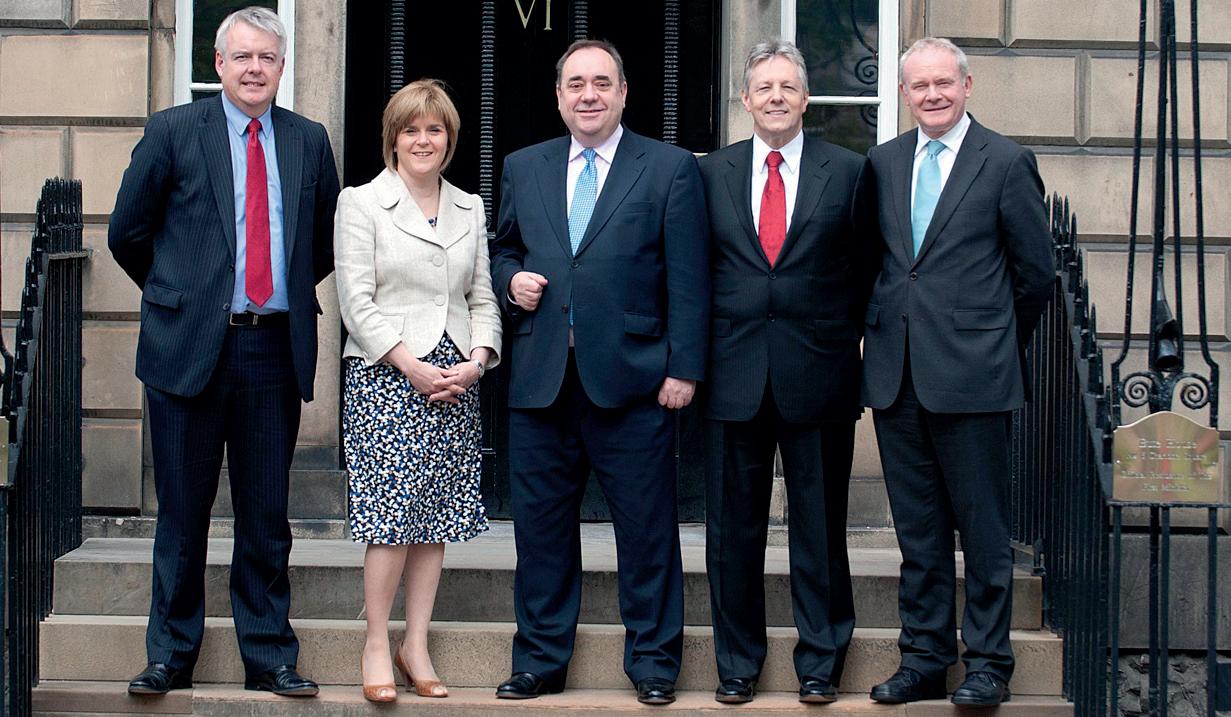
be offered control over Assembly elections, including the voting age and a fair funding strategy. Miliband went on to say that “Standing up for devolution, standing up for people to have the power to shape their lives and communities does not mean standing still. It means extending the power the people of Wales have over their own lives”. Controversy over
£1.2 billion, 8% of the current budget. New powers that would allow the Welsh Government vary a proportion of income tax looks likely to be decided with a referendum. Jonathan Edwards has argued that he “Cannot see a rational argument for a referendum on partially devolving income tax powers to Wales especially since Scotland are being offered full powers without a referendum.”
of the Silk Commission and last year’s Wales Act, the Lib Dems have found themselves in a situation whereby if they form part of a new coalition government they might be an influential force in furthering Welsh devolution amongst more sceptical Labour or Conservative colleagues. Addressing the Welsh
been, unsurprisingly, that devolution in Wales must be centred on fiscal responsibility in raising rather than solely spending taxes. David Cameron, in the conference added: that “only Conservatives understand that real devolution doesn’t just mean giving powers to Cardiff, but pushing those powers beyond Cardiff and out
potential disagreement between Carwyn Jones and shadow Welsh Secretary Owen Smith has come under the spotlight in recent weeks over divisions in full implementation of the second part of the Silk Commission. Smith has been criticised for his lack of coherence, that he is ‘less devolution friendly’ than some of his colleagues.
Plaid use the asymmetry in British devolutionary politics as a vision of inequality in deliverance of democracy. Polls are currently showing that support for the Assembly itself is relatively high, the party will seek to turn this popularity into securing full Parliamentary status, and full independence in the long term, with a fairer settlement for Wales in the short term.
Lib Dem conference last week, Nick Clegg added: “The genie is out of the bottle. We want proper Home Rule for Wales. We will be the guarantors that fair funding will be delivered. And we will continue to campaign to give Wales more control over its own affairs in areas like policing and transport.”
to more people, so they have more control over their lives”, despite having no power over this. Ultimately, the Conservatives are weary of passing control from central government, they are reluctant to implement the recommendations of the Silk Commission in full including powers over policing and youth justice.
18 POLITICS
Pictured: A ‘Trilateral’ meeting between the First Minister’s of each of the devolved nations.
Carwyn Williams
St. David’s Day agreement: raw deal for Wales
On the 27th of February, David Cameron, alongside Nick Clegg, stood in the Millennium Stadium in Cardiff to announce proposals for further devolution for Wales, the expected St. David’s Day agreement that aims to settle the devolution debate that has been ongoing for over 15 years.
But, what then has been delivered, and what has the response beento this?
When the agreement was being announced, First Minister Carwyn Jones was in the USA, promoting Wales, proving that he did not expect much of the agreement. Mr. Jones gave a statement to the assembly last Tuesday, on what he believes is a “rushed, incoherent and unsatisfactory” cross-party consensus.
“This is a baseline offer at best, and the government after May’s election will need to develop it much further
”Mr. Jones started his statement with a short timeline of recent events. In September, he stated: ‘with the potential prospect of the breakup of the United Kingdom as we know it, far reaching views and promises were made that the union needs to be further reformed, with Scotland and Wales at the heart of the debate’. In October, all of the parties in the National Assembly for Wales were united in a motion that called for fair funding, a reserved powers devolution model, progress on Silk 2 that includes the ability of the Assembly to control its electoral arrangements, devolution of Air Passenger Duty, and for all of these matters to be put forward in legislative proposals that
would be published before the current Westminster parliamentary session, before the end of March. In November, the Smith Commission reported on further devolution for Holyrood, whilst the Secretary of State for Wales agreed that a St. David’s Day agreement on further powers for the National Assembly for Wales would “end the arguments about devolution.” Carwyn Jones expressed that there were grounds for optimism at this point, however it rapidly became clear that the Secretary of State’s proposals would not deliver as expected.
A funding floor for the Welsh Government was proposed in last week’s announcements, a feature welcomed by many, including the First Minister in principle. However, many see the report as a missed opportunity, and there was no further detail in the report about when exactly this would be implemented, and what it would be set at. Mr. Jones stated that only when the funding floor issue has been finalised, could the Welsh Government consider partial devolution of income tax, with the report suggesting the opposite.
Te biggest feature of the St. David’s Day agreement was the prospect of Welsh devolution being set up on a reserved powers model, a prospect many have been calling for over a long period, to avoid confusion over what is devolved. Te UK government will see the Welsh Assembly as a permanent legislative power, another key step forward for the supporters of devolution. Also on the list of matters
A week in the Senedd



First Minister’s Questions
It was a rather tame FMQs this week, with many questions being asked outside the main political agenda, such as questions about the NHS or education. Andrew RT Davies quizzed the Minister about the business opportunities for Cardiff Airport, after the First Minister flew to the USA last week via Heathrow, rather than supporting the airport that the Welsh Government bought for £52m and invested £18m in. Carwyn Jones responded saying that his timetable was “squeezed” and Cardiff Airport is the smart way to fly to North America “if you have the time”, but for him it is the first choice when viable.
Leanne Wood mentioned the top-

being devolved are taxis and bus regulation, setting speed limits and control on bigger energy projects.
Despite this, there was disappointment from many that policing will not be devolved, there will be no further review of justice devolution, or executive powers for youth justice.
Te First Minister, and his colleagues in the assembly agreed, that this is a baseline offer at best, and the government after May’s election will need to develop it much further.
Meanwhile, in Scotland, devolution is also progressing after ‘the vow’, although it is not as radical as the SNP’s Nicola Sturgeon would have hoped, but certainly much better than what Wales has been offered. Tis high-


ic of protection for children, which brought up confusion over what is devolved in regards to children protection services. Wood mentioned that the Prime Minister was holding a summit about child protection, that would have implications for Wales. and mentioned she was disappointed that Wales was not being represented adequately. Carwyn Jones outlined that he and the Welsh Government had the view that criminal justice is not devolved, but criminal law is potentially devolved, being a different view from the UK government, outlining how important a clear further devolution package is essential. Other matters included local AM Jenny Rathbone asking about a sustainable steel industry in Wales, the
First Minister committing to meet UN human rights obligations, and Wales’ pride that we are the first nation to have a children’s commissioner to ensure child welfare.
Child Smacking Ban vote defeated again
Last Tuesday saw a prolonged discussion in the Senedd about an amendment in the Violence against Women Bill, which would amend the Children’s Act 2004, removing the defense of reasonable chastisement in smacking children, a matter that has been discussed at length for the last 13 years, being shot down every time. It was a long passionate debate from all sides, with Labour AM Julie Morgan calling for a free vote and it was about “finally doing right by the children of Wales.” AM’s such as Jocelyn Davies and Aled Roberts supported the amendment, admitting that they had ‘smacked’ their children in the past, but admit now they were wrong to do so.
However, other members displayed concern, with Antoinette Sandbach and Mohammad Asghar saying they would not support this bill at all at any point. Tey suggested that a smack to a child re-enforces disciplinary messages, and it is the parent’s right to do so, to stop radicalisation is Asghar’s opinion.
lights the differences in attitudes to Wales and Scotland. Holyrood will get control of some taxes, as well as collecting the first 10 per cent of any VAT receipts. Significant powers are heading north, including work program’, Air Passenger Duty, and the setting of income tax as well as benefit support.
Tese proposals are significantly more than what is being offered to Wales, but n further referendum is being offered,
Welsh political parties remain angry, with Leanne Wood stating that Wales is settling for “third-rate devolution”, and Carwyn Jones stating that Wales is not getting the same respect as Scotland.
(Crown Copyright)
Te majority of those in the chamber however supported the bill in principle, including Carwyn Jones, but said that this bill is not the right place for it, as the amendment would almost certainly lead to the bill being referred to the Supreme Court, delaying the bill significantly.
Cardiff Council special measures
A Plaid councilor along with Rhodri Glyn Tomas AM have written to the Public Service Minister Leighton Andrews asking for him to consider putting Cardiff Council under special measures. Te Labour led council has come under scrutiny recently because of the drama in the budgetary meeting last month. Te letter sates that the council has become ungovernable and they even consider forcing new elections.
More to be done to help women get into positions of influence
Presiding Officer Dame Rosemary Butler said last week that women are a resource that Wales cannot afford to waste, and it is important that women are “not just implementing decisions that men had made.” Butler went on to say she had tried to get more women as school governors, magistrates and politicians, and agreed with political parties prioritising women, but be-
19 POLITICS
Pictured: David Cameron and Nick Clegg delivering the ‘St. David’s Day Agreement’
with Carwyn Williams




March
Stiff Little Fingers
08/03/15, £18.50 ADV
The Stranglers
10/03/15, £23 ADV
Sleaford Mods
10/03/15, £10 ADV
Halestorm
13/03/15, £15 ADV
Four Year Strong
24/03/15, £14 ADV
April
Lower Than Atlantis
09/04/15, £12 ADV

Limehouse Lizzy vs Livewire AC/DC
17/04/15, £20 ADV
May
Super Furry Animals
01/05/15 - SOLD OUT
Super Furry Animals
02/05/15 - SOLD OUT
Super Furry Animals
03/05/15 - SOLD OUT
Uriah Heep
07/05/15, £22 ADV
Hoobastank/P.O.D/ Alien Ant Farm
15/05/15, £22 ADV

Legend –Bob Marley Tribute
June
24/05/15, £13 ADV Young Guns
04/06/15, £12.50 ADV
July
Karyn White
11/07/15, £20 ADV Peace
October
03/10/15, £15 ADV
@CARDIFFUNION CARDIFFBOXOFFICE CARDIFFBOXOFFICE.COM | All tickets subject to booking fee
Carwyn Williams
Cameron ‘chickens out’
Cameron states he wants to ‘get on’ with seven way debate rather than go head to head with Miliband
David Cameron last week announced a “final offer” on the televised debates, agreeing to take part in only one debate, featuring seven party leaders, by the end of this month, rather than the three debates proposed by broadcasters. Reaction to this announcement has been very critical of Mr. Cameron, from the other party leaders included in the debate negotiations, as well as from journalists and the general public.
Ed Miliband said that the Prime Minister was “cowering from the public”, confirming once again that he was ready to challenge Cameron to a debate anytime, anyplace. Mr. Miliband continued, saying that the seven-way debate was always going to happen, but that a debate between the two party leaders was desperately needed also.
Should the seven-way debate go ahead, it would be a 90-minute con-
test, giving each party leader around twelve minutes speaking time each, if the time is divided up equally.
As the leader of the opposition in 2010, Mr. Cameron led calls for the first ever televised leader debates in British politics, and even said last year how good debates were for democracy, but it seems the Prime Minister will not deliver the same airtime this time around. Te 2010 debates, they led to a ‘Clegg fever’, surging support for the Liberal Democrats, which could happen to the Greens, SNP and Plaid Cymru this year, and have the opposite effect ON the leader of the Government.
Defending his decision, Cameron said that the broadcasters were to blame for the hurdles in place for the debates, and insists that the election campaign must be used to get around the country, rather than debate in studios. Te plans from the broadcasters included a head-to-head de-

bate between Miliband and Cameron on the 29th April, with only a week until election day, that would give the leader little time to recover from a bad debate.
In an interesting twist on Tursday, Nick Clegg said “If David Cameron is too busy or too important to defend the record of this government with Ed Miliband then I offer myself. How about that? I’ll do it instead.” Tis could mean that the Conservatives will miss out on vital airtime where every other party could benefit. Tis
21 POLITICS “ ”
is the first time the Prime Minister has agreed to a debate, stalling earlier this year calling for the Greens to be included.
What next? Ultimately, the broadcasters could cancel the other debates, have Miliband up against Clegg, or call Mr. Cameron’s bluff, and hold all the debates, with an empty seat should the Prime Minister fail to turn up. We must remember that in 2010, up to 20 million people watched the debates, meaning they could have a big effect on the electorate.
General Election: Hopes and Fears
If David Cameron is too busy or too important to defend the record of this government then I offer myself
Nick Clegg
HOPES: Alexander Norton

Register to vote in the Elections: http://www.gov. uk/register-tovote
Iplan on voting Labour; albeit reluctantly. It’s my opinion that they’re very much the best of the bad bunch when it comes to Election ‘15.
My hope is that come the campaign, Ed Miliband finds something that has been missing for the past four-anda-bit years - the spark, charisma and communication skills necessary to go out there and win an election. True, the public gave an incredibly grey John Major the benefit of the doubt in ‘92, but they kicked him to the kerb in ‘97. Dull men lose elections.
Ed’s problem isn’t only that he’s a bit white bread, but that he’s com-
Immigration was a key part of this week’s PMQs with Labour claiming that the Conservatives have failed to meet targets set out in their manifesto to cut net migration. Mr Cameron blamed this on migration from within the European Union, and the need for reform of the benefits system.
Miliband was more successful at sustaining attacks on the Prime Minister this week, claiming that Mr Cameron’s immigration promises made Nick Clegg’s pledge on tuition fees “look like the model of integrity”, suggesting this would make voters distrustful.
Despite this, Mr Cameron attempted to turn things around by using the Conservative manifesto from the last election, more specifically at benefits associated with pensioners and can-
bining that with relentless awkwardness We’ve all seen him trying to eat a bacon sandwich, or give money to a beggar - and he does it as if he’s being operated via remote control.
Of course, the more serious issue is that anyone who’s not a hardcore politico doesn’t really know where he stands on anything. Tere are some policies buried deep in Labour’s manifesto, but most people aren’t going to bother to look. He needs to get them out there with a big, forced smile.
In short, all I want is for Ed to go out there and act like a human being. Is that really too much to ask?
cer treatment. Following this was a whole other range of commitments the Prime Minister argued had been achieved since 2010.
Omitting immigration from this list was not the best idea and Miliband continued to press the issue. Mr Cameron said that plans to address increased migration from within the EU were being implemented.
Again, the Prime Minister took recourse to other manifesto promises, namely cutting wasteful spending.
Miliband challenged the Prime Minister about whether he would attend the head-to-head debate proposed by the broadcasters. Mr Cameron seemed evasive as he repeated the well-rehearsed line of Labour not being able to talk about the economy, but when asked again he suggested that a
Ideally you’d think that we’re at a bit of a political crossroads. An increasing number of parties are becoming significant in the British political sphere, exemplified by the possibility of a seven-way TV debate prior to the election.
Te credibility of politicians in the eye of the public couldn’t be much lower, and coming off the back of a recession, trust is also hard to come by.
I fear that we’ve been here before though, and nothing has changedat least not to the benefit of the people. New parties with ideas that they promote as being fresh and authentic
seven-way debate was the only acceptable format, and that the two leaders were having a debate as they spoke.
Another key point in the debate came from Brent North’s MP Barry Gardiner who raised concerns about cancer targets being missed; affecting 100,000 patients. Mr Cameron gave a detailed answer, highlighting the importance of earlier diagnosis by GPs and made assurances about the cancer drugs fund.
Te Prime Minister was also criticised for being out of touch from those with lower incomes. Mr Cameron defended his record on apprenticeships and jobs, claiming that he thought Labour “would welcome that”.
Tax avoidance briefly emerged throughout the debate, although the issue was quickly closed. It seems that
are simply recycled and soon become stale and tired cliches.
We’re seeing it already with UKIP and the Greens; while relative newcomers, their policies are already being exposed and churned over in the media so much that they’re fast becoming old news.
By its very nature politics is about change, but there doesn’t seem to be much change afoot, and there hasn’t been for a very long time. Te optimist in me says that the proliferation of new parties means that they will have to diversify and change, but I just don’t see it.
this has fallen off the agenda.
Liberal Democrat MP David Ward questioned whether behaviour displayed by Mr Cameron and Mr Miliband at PMQs really benefitted the image of the House of Commons. Te Prime Minister said there were ways it could be improved, but that it served an important function.
Compared to recent debates, Labour appeared more certain this week and applied more sustained pressure on the Prime Minister. Immigration is a particularly important issue for the Conservatives, and attacks on this policy were well-directed. Although Mr Cameron made a reasonable attempt to defend his record, he came across as quite evasive, meaning Labour seemed to emerge as the stronger party.
Weeks to go until May 7th 9
 Pictured: 2010 TV debates
Pictured: 2010 TV debates
Minister’s Questions
Kieran Lewis
Prime
FEARS: Joe Atkinson
SCIENCE
tweet us @gairrhyddsci email us science@gairrhydd.com or visit us online at gairrhydd.com/science
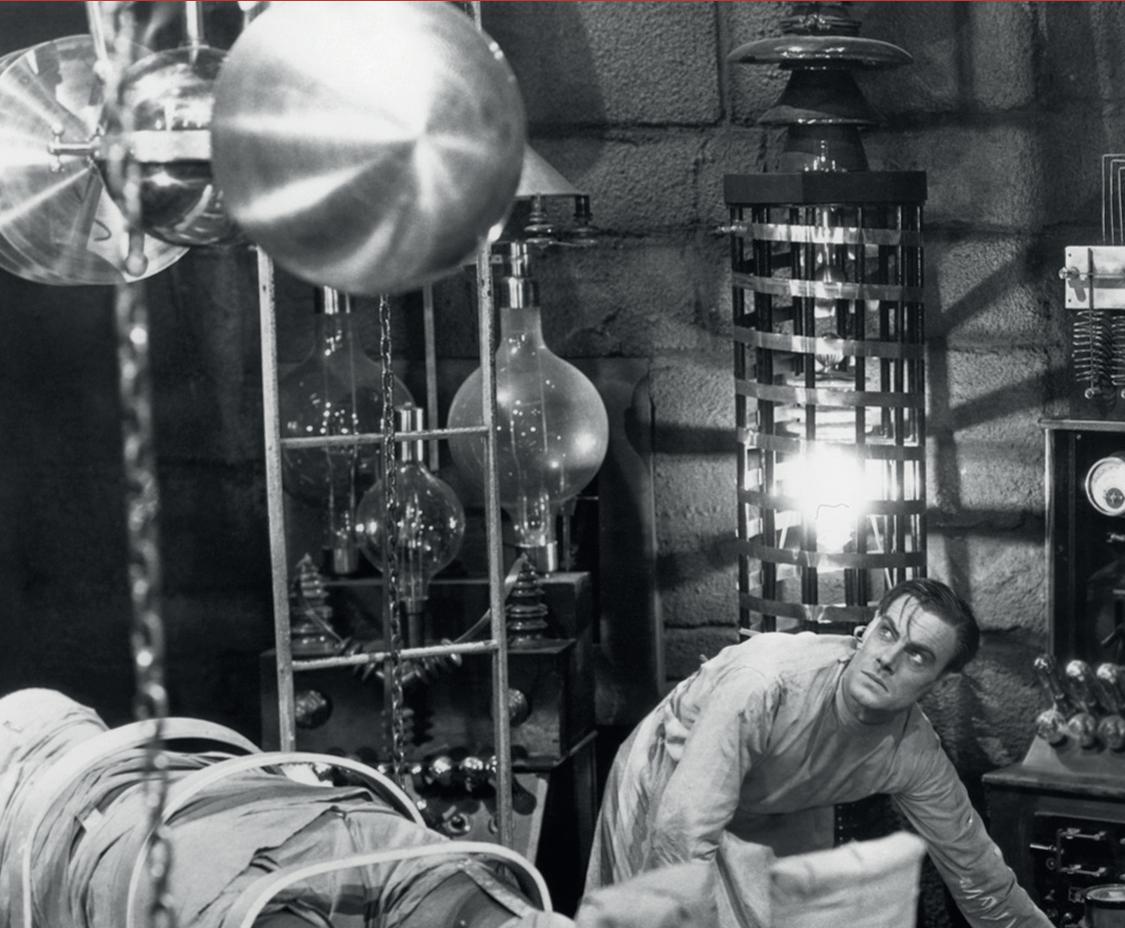
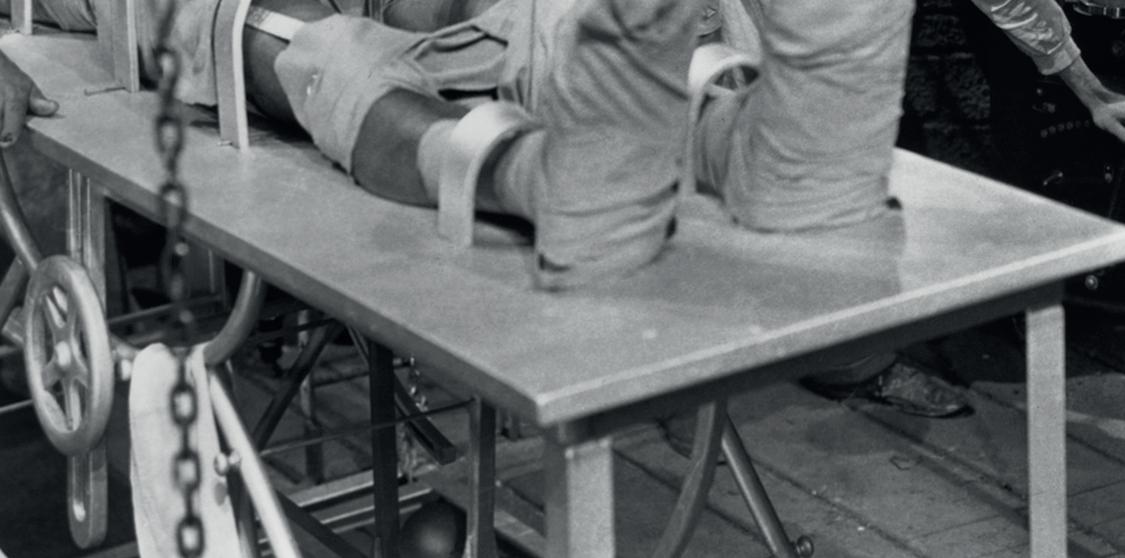

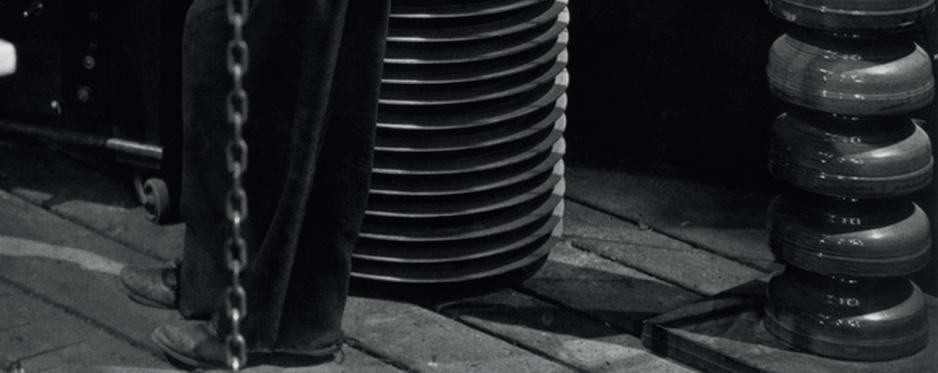

Horror-style head transplants: not going to happen anytime soon
Shanna Hamilton
MThis is science fiction. He can write a novel about this and sell it on Amazon and maybe that’s the best course of action
ary Shelley’s “Frankenstein”, published in 1818, utterly terrified Victorians of the age, contributing to the lasting wariness of scientific advances and of doctors “playing God” that continues to plague modern medicine. In the classic horror story, a full body transplant was performed, with one person’s head stitched to another person’s body. The greenfaced square-headed monster was born that we are oh-so familiar with today. What could have been a fictional description of a sensational scientific marvel turned swiftly into a slasher plot – Frankenstein went on a killing spree and murdered his doctor’s entire family.
It may seem unusual to discuss a fictitious storyline within the Science section of Gair Rhydd, but the story is more than relevant to a contentious research plan described in The New Scientist earlier this month. Italian neurosurgeon Sergio Canavero, has been “executing a fullblown media offensive”, discussing his radical plans to transplant one person’s head on another person’s body, an astronomical and potentially impossible feat, all within the next two years.

Got a story idea? Let us know: science@ gairrhydd.com
Canavero is not the first to take inspiration from Shelley’s classic in total body transplants. Robert White, neurological surgical professor at Case Western Medical School made history in 1970 when he transplanted the head of a monkey onto the body of another. Although described as a success, the monkey only lived for 8 days and it suffered significantly during this period. The spinal cord from the head and from the body could not fuse, so the monkey was paralysed. Writing about his work, White said, “What has always
been the stuff of science fiction – the Frankenstein legend, in which as entire human being is constructed by sewing various body parts together – will become a clinical reality early in the 21st century.”
Canavero, of the Turin Advanced Neuromodulation Group, is surprisingly confident he can overcome all the experimental issues, as well as ethical boundaries, to complete this somewhat frightening feat. In a study published in the journal Surgical Neurology International, the surgeon describes how after stitching a head onto the body of another person, he would keep the patient in a coma for several weeks, while trying to stimulate nerve growth with implanted electrodes.
Te bold surgeon is convinced that polyethylene glycol will successfully glue the nerves back together, and likens all the severed neurons to spaghetti. “Italian’s adore spaghetti, I love spaghetti, and spaghetti is what’s called for here”, he claims. Although the chemical has been somewhat effective in restoring function in the injured spinal cords of rats, this a far different animal model to the human being.
Some are critical of the claim and argue Canavero is ignoring other vital nervous system components that are necessary for us to function. Dr Chad Gordon, a surgical professor of Johns Hopkins University, said, “Tere’s no way he’s going to hook up somebody’s brain to someone’s spinal cord and have them be functional. On the conservative side, we’re about 100 years from being able to figure this out. If he’s saying 2, and he’s promising a living, breathing, talking, moving human being? He’s lying.”
During transplantation, the vagus nerve found at the base of the brain
would be severed. It is extremely important to the body’s functioning, controlling heart rate, blood pressure and other vital systems. Tis nerve would take at least a year to grow back, and without it, the newly transplanted body would need invasive and artificial life support systems to maintain it. Tis would be traumatic, and unfeasible.
“You couldn’t sustain a person for that long without a vagus nerve, unless you can somehow artificially support the whole body for about a year,” said Dr Christopher Winfree of Columbia University. “I think that’s where this might break down.”
However, Canavero is raring to go. “I have enough animal data… Give me a brain dead organ donor,” he said, with volunteers apparently lining up. The surgeon believes that after surgery, he will be able to keep the newly stitched patient in a coma, and by bathing the spinal cord in electrical current and polyethylene glycol, the cord will fuse
and patients will be walking within a year. All this promise despite the fact the spinal cord does not regenerate. “The genes in a mature mammalian central nervous system that control regeneration are repressed,” says neuroscientist Michael Beattie, therefore this cannot be reversed with a simple chemical and electricity.
Binhai Zhang, neurosurgeon at UC San Diego, thinks Canevero’s claims are farcical and his ethics non-existent. “He’s insane. You can’t put a head on somebody else!” Zhang, like many other respected scientists in the field, are unimpressed with the surgeon’s media performance. Millions of paralysed people may have the false hope of getting a new, working body, while real medical solutions are shadowed by a “hero of a fictional plot”. Zhang said, “This is science fiction. He can write a novel about this and sell it on Amazon and maybe that’s the best course of action for him.”
Below:
Neurosurgeon Sergio Canavero, who proposes head tranplants will be possible in two years
(Source: oggi)
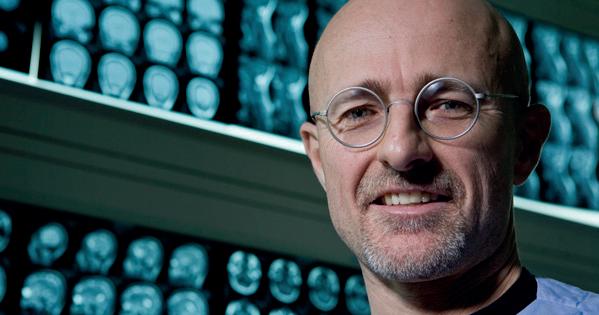 Pictured: Above: Images from the 1931 film Frankenstein (Source: Insomnia Cured Here, Flickr)
Pictured: Above: Images from the 1931 film Frankenstein (Source: Insomnia Cured Here, Flickr)
“
”
Harry Bligh
#TeDress: a scientific explanation
#TeDress has been causing a stir online and in the news all over the world. On the 26th February 2015, a picture of this dress was uploaded to Tumblr and after being shared on various different social media, divided viewers world wide with #TeDress trending globally. Te question is, is it black and blue or is it white and gold? And why do we each see a different interpretation?
Tere are many reasons and theories as to why we see it differently.
out as a ‘yellowish/gold/brown’.”
Erin Goddard, from Macquarie University, also in Sydney compared the dress debate to the well-known ‘Spinning Ballerina’: “you can see it from either way, but once you see it one way or the other, its very hard to switch.”
What’s correct is the dress itself, which is for sale online, is actually blue
Professor James Pomerantz, a Psychology professor from Rice University, Texas, stated that it is both a phenomenon of visual perception and photography. “ Tere is a problem that eyes and cameras struggle with called ‘white balance’. If you look at your camera closely, there may even be a white-balance control on it that makes this setting for you”. He explained why people saw it as white-gold, “What’s correct is the dress itself, which is for sale online, is actually blue. Tat means that the lighting under which the photograph was taken must have been a fairly good white”. In scientific terms, he explained the light must be “an even mixture of all wavelengths or colours and thus a flat spectrum.”
Bart Anderson from the University of Sydney, Australia, has given an insight into the colour of the dress and why we may see black as gold and blue as white. “ Te dress is actually a complicated mixture. If you find the RGB values of gold/black, they come
For this article, I did a small poll around the university and Students’ Union, asking people to look at the photograph off my phone and state what colours they were seeing. Although not a large poll and the results may not be significant, findings were rather surprising. We know that the actual dress is blue and black, however, 52% saw the dress as white and gold and 39% saw it as its original black and blue colours. Surprisingly, 9% saw it as blue and gold, an unusual combination which was not in the original debate.
Some people told me that they saw both the colour schemes which had changed at different times. One person stated “I see it as white and gold, but after looking at is for a while, I then see it as black and blue”. When I first saw this photo, I was adamant that it was white and gold, however, the next day I saw it as black and blue and now see it as black and blue.
We have the eagerly awaited scientific explanation from academics from across the globe. However, the debate continues with the opinion across Cardiff students and the world split into whether the dress is white/ gold or blue/black.

STAP stem cells: a sad tale of misconduct
The notion of being able to turn normal skin cells into stem cells by placing them in an acid solution sent the scientific community into a wild frenzy last January. However, as the research was scrutinised, the remarkable story unravelled, and the authors have suffered a spectacular fall from grace. It has been concluded that the study involved serious misconduct, and punishment has been severe. But is this becoming an all too familiar story? Why do scientists lie?
Te “STAP” research papers gained rapid notoriety thanks to the therapeutic promise stem cells hold. Tese cells have regenerative properties – described as “cellular infants”, they have not differentiated into any particular type, so in theory can be turned into any cell you like. Muscle cells, kidney cells, heart cells – with the right factors and chemical environment, scientists are able to reprogram the cells and are now moving towards utilising this for therapies.
Obtaining stem cells is particularly tricky and ethical battles surrounding their use have raged for years. Tis explains why such a simple breakthrough was so sensational; it meant bypassing a complicated method that involved changing genes in a cell’s
DNA, as well as the ethical complications when using human embryos to derive stem cells. “STAP” cells, short for stimulus-triggered acquisition of pluripotency cells, were thought to be the answers to many researchers prayers.
Te excitement soon turned to caution and distrust, thanks to the advent of post-publication peer review websites. Accusations began flying across blogs and media outlets of data manipulation, plagiarism and serious misconduct. After an internal investigation at RIKEN, where much of the work took place, it was determined that authors were guilty of scientific misconduct. Te research was consequently retracted from giant journal Nature
Lead author Haruko Obokata, once pedestalled as a hero in Japan and pegged for a Nobel prize, apologized for “insufficient efforts, illpreparedness and unskillfulness” as well as overall “benevolent mistakes”, blaming her youth and inexperience. However, she continues to maintain that STAP cells really do exist, despite her own failed attempts to reproduce them since.
Te tragedy in this tale however, is the suicide of Yoshiki Sasai, a wellrespected stem cell scientist and
Obokata’s senior during her work. He was heavily criticised in RIKEN’s report for poor supervision, and was “overwhelmed with shame” in his response. After suffering for months with depression, he left behind farewell notes to be found after his death. One pleaded with Obokata; “Be sure to reproduce STAP cells”.
It appears that scientific misconduct is on the rise. A study published by Proceedings of the National Academy of Sciences clearly outlines this: 67 per cent of retractions since 1977 were due to allegations of misconduct, including fraud and plagiarism. Most worryingly, “ Te percentage of scientific articles retracted because of fraud has increased more than 10 fold since 1975.”
In Issue 1041 of Gair Rhydd, I commented on the pressure upon academic researchers to publish in order to secure funding, get excellent REF ratings and ultimately secure a job. It is no surprise that some scientists may therefore feel the need to manipulate data to get results. Michael Shermer, writing for Scientific American, said, “Given the fiercely competitive nature of research funding and the hardscrabble intensity of scientific status seeking, it is surprising that fraud isn’t more rampant.”
It is more important than ever that researchers remember that misconduct can have serious implications and cause a public distrust of scientific advances that can last a lifetime.
Famous for his diagrams that explained the behaviour of subatomic particles, Nobel Prize winner Richard Feynman was vocal about the importance of scientific integrity: “ Te first principle is that you must not fool yourself—and you are the easiest person to fool.... After you’ve not fooled yourself, it’s easy not to fool other scientists. You just have to be honest in a conventional way after that.”

23 SCIENCE
Pictured: Te elusive dress that caused a Twitter storm. (Source: Flickr)
“ ”
Pictured: Haruko Obokata, the lead author of the controversial research (Source: Kyoto)
Shanna Hamilton
24 SCIENCE
Science’s most prominent figures are at risk of being forgotten
Babatunde
Onabajo
Arecent survey commissioned to coincide with the DVD release of BAFTA nominated film Mr Turner, eponymously named after the eminent British artist JMW Turner, revealed some startling findings: One in every four Britons do not know why Sir Isaac Newton or Charles Darwin are famous and about one in every three did not know Sir Alexander Fleming discovered penicillin.

Got a story idea? Let us know: science@ gairrhydd.com
“It’s about time these great figures came back on our national radar and received the recognition they deserve,” said Dr Paul Readman, who is the senior lecturer of modern British history at King’s College, London. How right he is, yet the recent survey reveals a particular bias against scientists. Of those who Britons were most unfamiliar with, the majority were scientists: Sir Tim Berners-Lee, Sir Isaac Newton, Charles Darwin and Michael Faraday.
Te chances of Darwin, in particular, being increasingly forgotten are even greater when one considers he will not be featured on the £10 note by 2017 as a result of pressure from activists on Twitter that he be replaced with writer Jane Austen.
It is noteworthy that Britons are most likely to be unfamiliar with scientists, as scientists have arguably done the most to improve our material wellbeing. Berners-Lee invented the World Wide Web and Faraday contributed to electricity being used in everyday devices.
It goes without saying that more needs to be done to keep scientists on the national radar lest they be forgotten. However, to tritely recommend that history curriculums emphasise scientists more is not enough. Traditional educational models are being shattered with the rise of technology and statements such as “history teachers should do more” are increasingly becoming an anachronism in a world of Facebook and Twitter.
Facebook pages such as “I fucking love science” do an excellent job of showcasing all that science and scientists have to offer outside of the usual mundane setting of a classroom. Similarly, NASA did a wonderful job of ensuring that the Rosetta mission, a project to flyby comet 67P, featured prominently in the British press. Or-


ganisations that aim to improve understanding of science and scientists should do more to utilise Twitter to get scientist-orientated hashtags trending worldwide. A “#DarwinDay” on February 12, commemorating the birthday

of the man himself, would do more to get the public’s attention about the man himself than an hour-long lecture ever could. We forget the scientists who have done so much at our own peril.
Giant gerbils could have been behind black death spread
not getting credit for discovering
(Source:
Antonia James
After years of accusations, the black rat might finally be acquitted of its part in the outbreak of the bubonic plague in the Middle Ages, widely known as the black death. Instead, a new culprit has been identified: gerbils.
Recent studies by Prof Nils Christian Stenseth, from the University of Oslo, show that the much-vilified black rat may in fact be an innocent party and not to blame for the outbreak of the bubonic plague that ravaged Europe in the mid-14th century. Te study argues that the plague may actually have its origins with gerbils in Asia.
“
As an explanation for the Black Death in its own right, [rat fleas] simply isn’t good enough
”
Te bubonic plague of Europe, known mainly as Te Black Death, arrived in Europe in 1347 and quickly dispatched 60% of London’s population. Te recurrent outbreaks continued until the 1800s causing the death of over 75 million people. Previously it had been thought that rats were the culprits; they carried diseased fleas that caused infection when they jumped from rats to humans.
However, DNA extracted from 25 skeletons uncovered in London during railway construction in March 2014 suggests that the disease was pneumonic - not bubonic - meaning that sneezing and coughing most likely spread the disease.
Dr Time Brooks theorised that “As an explanation [rat fleas] for the Black Death in its own right, it simply isn’t
good enough. It cannot spread fast enough from one household to the next to cause the huge number of cases that we saw during the Black Death epidemics.”
Prof Stenseth studied tree rings to assess the climate across Europe and Asia but found no relationship between the climate in Europe and plague outbreaks suggesting that there is no evidence of a rat driven outbreak. He said ‘For this you would need warm summers, with not too much precipitation.’ Dry but not too dry.
However, his research concluded that there were optimum climate conditions in Asia for another suspect, the plague carrying gerbils. It seemed curious to him that each time Asia enjoyed a wet spring and a warm summer, Europe then experienced a plague outbreak. Te sneaky rodents and their deadly bacteria had snuck a ride along the Silk Road, at a time when trading was at a peak.
It is understood that the plague is the result of the introduction of the bacteria Yersinia Pestis , found in the bones of the 25 skeletons. Te theory is it was carried by gerbils and their fleas into Europe each time there was a surge in population in Asia.
Tis would explain the ‘waves’ of infection, despite the constant presence of rats in Europe, as it was reintroduced several times following favourable climatic conditions in central Asia. Research will now be conducted by



... one in every three did not know Sir
Pictured: Sir Isaac Newton, clearly displeased at
gravity.
Ku Meo, Flickr)
”
“
Alexander Fleming discovered penicillin
Pictured: Te Asian gerbil, adorable ball of fur and possible vector of the bubonic plague. (Source: ZAKempson, Flickr)
Stenseth and his team to analyse DNA from ancient skeletons uncovered across Europe. If the samples show genetic variation of the bacterium Ye-
rsinia Pestis it will support the theory of reintroduction and at that point Stenseth thinks “we’ll have to rewrite the history books”.
Meryon Roderick
North American and European space agencies begin race to Europa
The North American Space Agency (NASA) have announced that they are currently planning a $2 billion mission to Europa, an icy moon of Jupiter and the best candidate for a location for extra-terrestrial life, which would launch in the mid 2020s. However, the European Space Agency (ESA) may beat them to the punch, with their plans to launch the Jupiter Icy Moons Explorer (JuICE) in 2022.
Te Voyager spacecraft passed Europa in 1979 and photographed what looked like ice floes and deep fissures running along the moon’s frozen surface which suggested that underneath the ice, Europa might be covered in a huge global liquid ocean. Tis suspicion was strongly supported by the Galileo spacecraft, named after the man who discovered the moons of Jupiter, when it sent data about Europa’s magnetic field back to Earth.
provide conditions that could support life. Tough no sunlight would be able to make it to Europa’s ocean bed, this would not necessarily prohibit life forms from evolving deep beneath the ice.
has even been theorised that life begins on Earth at these hydrothermal vents. If vents like these also exist on Europa then there is no reason that life could not have sprung up around them.
“
If vents like these also exist on Europa then there is no reason that life could not have sprung up around them
”
NASA’s mission, named the Europa Clipper, would not orbit Europa itself but would instead orbit Jupiter and do 45 flybys of Europa. Tis is because Europa is surrounded by a strong radiation field that would almost certainly interfere with any satellite that orbited it permanently. Te purpose of this mission is to establish whether conditions that would support life are present on the icy moon, paving the way for a potential later mission to land a probe on the moon’s surface.
Te ESA is putting its hopes in JuICE which has a much broader mandate than the Europa Clipper. JuICE would do a full exploration of Jupiter, exploring its atmosphere and magnetosphere as well exploring its moons Ganymede, Europa and Callisto. JuICE will actually focus more exclusively on Ganymede than Europa but if it is the first of the two missions launched it could offer new insight into Europa and the entire Jovian system nonetheless.
Europa’s ocean, if it exists, probably comes into direct contact with the rocky core of the moon which would
Meryon Roderick
Truvada only costs £360 per person per month. There is a clear financial incentive for the NHS to stock it
On Earth there are cracks in the seafloor, known as hydrothermal vents, which spout hot water and minerals into the surrounding ocean. Tese have been found to support animal species which derive energy directly from the vent unlike most other life forms on Earth which use the Sun as a primary energy source. It
Hopefully the fact that NASA is funding some components of JuICE, suggests that these two ambitious space agencies are willing to work together to achieve what must be one of the most exciting space fairing objectives of the 21st century. As to whether there is life on Europa, only time will tell.

Miracle pill could dramatically cut HIV transmission
Areal world study carried out on the Anti-retroviral drug Truvada has shown that it can cut HIV infections in men who engage in sexual intercourse with other men by up to 86%.
Te study, which was carried out in 12 NHS trusts, was designed so that participants could decide whether or not to take the pill on a daily basis which mimicked real world conditions. 545 men took part who were all considered to be at high risk of contracting HIV based on the number of sexual partners they had had in the previous 90 days.
Half of the group received Truvada immediately whereas the others were not. In the group who received Truvada, only three men contracted HIV compared to 19 in the group who did not receive the drug. Te trial was so successful that after a year the control group were also given the pill.
Te hope is that soon Truvada will be used as pre exposure prophylaxis (PrEP) in areas such as Central London where one in eight sexually active gay men are thought to have HIV. Te pill would be available on the NHS and
would be taken much like the contraceptive pill, daily by those at the highest risk.
Sheena McCormack, Professor of clinical epidemiology at the MRC Clinical Trials Unit at University College London said that “Tese results are extremely exciting and show PrEP is highly effective at preventing HIV infection in the real world.”
Te drug appears to make economical sense as well. Te treatment that the 19 infected men from the nonTruvada group will have to receive will probably stretch to almost £7 million over the course of their lifetimes, whereas Truvada only costs £360 per person per month. Tere is a clear financial incentive for the NHS to stock it.
Some have voiced criticisms of Truvada. Aids Health Foundation President Michael Weinstein has expressed concern that widespread use of the drug may mean more gay men abandon the use of condoms, causing the spread of other sexually transmitted diseases that Truvada does not prevent.” A government-sanctioned widespread scale up of PrEP appears to be
a public health disaster in the making” said Weinstein in an interview with Buzzfeed.
Anthony Hayes of the Gay Men’s Health Crisis, a non-profit organisation, strongly disagrees. “Te only disaster would be to stop encouraging
people to explore taking PrEP if they are at high-risk for contracting HIV.” Te results of medical trials would appear to agree with Hayes. If the HIV epidemic is to be stopped then new treatments such as Truvada need to be explored.

of HIV.
25 SCIENCE
Pictured: Truvada, touted as a miracle pill to prevent the spread
(Source: Tomas Tomas)
“ ”
Pictured: Europa, one of the moons of Jupiter. (Source: bambam131. com)
SOCIETIES
Barney’s Note
Hello there everyone. Te Students’ Union elections have now ended and we know the lucky soul who is going to be taking over the role of VP Societies when I leave in June. It is none other than the editor of the very newspaper section you are reading right now – Hannah Sterritt! Keep an eye out next year –she will be having a big impact on the
What’s On
Monday 9th March
Student Advice Student Advice Drop In Noon - 2pm
Meeting Rooms close to the IV Lounge
Anime Society
Annual General Meeting 6pm - 7pm 4A, Students’ Union
Tuesday 10th March
Business School Society
Spring Ball 2015 7pm - 11pm
National Museum, Cardiff
Nightline
Call Nightline to chat about anything Every night 8pm - 8am
Wednesday 11th March
Skills Development Service
Short Course in Personal Effectiveness
2pm - 4pm For location information e-mail SDS.
Student Minds
running of societies. Outside of elections, several things of note are going on in the wonderful world of Societies. Tickets for Go Global and the Societies Ball are on sale and going fast! As these events tend to sell out in advance, be sure to pick up a ticket on the website if you intend on coming. Go Global is only £4 for an evening show of our wonderful inter-
Yoga Session 1: 6.20pm 6.20pm - 7.20pm 4C, Students’ Union
Green Party Society Introductory Meeting 7pm - 8pm Te Lodge next to Y Plas, Students’ Union
Promotion of Animal Welfare Society PAWSFEST featuring Animal Brothers, Lights In Te Field, By Jupiter and Atticus Atlas 7.30pm - 11.30pm Gwdihw. 6 Guildford Crescent, CF10 2HJ
Student Minds Yoga Session 2: 7.40pm 7.40pm - 8.40pm 4C, Students’ Union
RELIGsoc Retro Social 8pm - 3am Retro, Cardiff
Tursday 12th March
Maths Society Walkabout Social 8pm
Ptweet us @gairrhyddsoc email us societies@gairrhydd.com or visit us online at gairrhydd.com/societies
national societies so do come along if you are free – it is on the 21st of March so look lively and buy a ticket! Te Societies Ball is a fancy evening dinner and awards ceremony put on for the members and committees of our Societies! Again, this event sold out last year so move quickly if you or your society would like to attend. It is a fantastic party and tickets are on sale NOW! Before both of these, Cardiff Fringe Festival is next week - keep an eye out for details about all of the upcoming events. As ever, get in touch if you need anything from me!
Walkabout Cardiff
Skills Development Service Deaf Awareness Session 6pm - 8pm CSEV, 2nd floor Students’ Union
Expression Fitness
6pm - 7.15pm 4A/B, Students’ Union
Student Enterprise How to Develop Your Product 6pm - 8pm 4J, Students Union
Students’ Union
Wales In Westminster Lecture: Mark Williams MP 6pm - 8pm
Birt Acres Lecture Teatre, Bute Building
Student Minds Eating Disorder Support Group 6.15pm - 7.15pm 4F, Students’ Union
Friday 13th March
Duke of Edinburgh Society Snowdonia Practice Weekend 13th March - 15th March
RAG
Comic Relief Fundraising Funfair 11am - 4pm

Students’ Union
Operatic Society CUOS Production -Te Fairy Queen 13th March 7.30pm - 14th March 10pm Te Gate Teatre, Roath, CF24 3JW
Saturday 14th March
BRAWL
All Day Roleplaying and Wargaming 9am - 10pm Rooms B/C/D, Students’ Union
Skills Development Service Emergency 1st Aid Course
9.30am - 4.30pm Room 2, CSEV
Asian Society Elements 2015: Guru 6.30pm - 3am
Royal Welsh College of Music and Drama
Sunday 15th March
UNICEF
5-a-side football 9.30am - 3pm
Gol Football Centre, Lawrenny Avenue CF11 8BR
Expression Aberystwyth Dance Competition
12.30pm - 5pm Aberystwyth
The Green Party Society returns
olls are showing at the moment that the Green Party is consistently doing well among young people in terms of political support. I’ve been a member of the party myself since June 2014 and I’m not the only one who’s discovered what the party has to offer. It was a shame to see that Cardiff University Green Party Society had to disband at the end of the 2013-2014 academic year due to committee members moving on and no one willing to fill the places. I decided to investigate how we could get it back up and running and successfully did so this month.
Te main reason was to ensure that
Cardiff University students have the chance to investigate the Green Party and join in if they want to in the run up to the General Election. We have a fabulous connection with the local party who are ready and willing to help us along and hopefully have the society campaign for the party for the upcoming general election, but especially the 2016 Welsh Assembly elections. We’ve got a committee, we’ve had some interest but now we just need members to really kick it off
In brief, Te Green Party wants social, economic and environmental justice and believes politics offers a demo-
cratic opportunity for positive change. We want to make sure the students of Cardiff have all the options, not just the two parties!
If you’re a keen Green Party activist or you’re just a bit curious and want to find out more, please come to our Introductory Meeting this Wednesday 11th March at 7pm in Te Lodge next to Y Plas in the Students’ Union. You can find the Facebook group by searching ‘Cardiff Uni Green Party Society’ where you can get all the updates! Everyone is welcome and you can join officially on the Students’ Union website for £1!


Have an event you want covered? Email: societies@ gairrhydd. com
Kate Delaney
Hannah Sterritt
Purcell’s The Fairy Queen
A modern interpretation of a musical fantasy by the Operatic Society
Preparations for Cardiff University Operatic Society’s version of ‘The Fairy Queen’ by Henry Purcell have been in the planning stages since as early as May 2014, and will be performed on March 13th and 14th. The Fairy Queen is a modern interpretation of the musical fantasy based on the ideas and characters presented in Shakespeare’s comedy ‘A Midsummer Night’s Dream’, first performed in 1692.
In this new adaptation of Henry Purcell’s ‘The Fairy Queen’, Cardiff University Operatic Society have reworked the tale of Titania and Oberon into a vibrant story of vengeance and romance with a modern twist. The scene is set on the eve of King Oberon’s birthday party, where the Fairy Queen is angered to discover her husband flirting with another woman and vows to seek revenge. In the hope of making Oberon mad with jealousy she brings a mortal boy to the Faerie Realm as her new suitor, but it soon transpires that Titania is not the only one with a vengeful streak. In a world of merriment where the
familiar can all too quickly morph into the uncanny and bizarre, will the young king and queen ever find reconciliation?
With a young, enthusiastic cast, this fun production promises to bring the vitality and entertainment of Purcell’s wonderful music to new audiences. Operatic Society President, James Chitham, says “It has taken a lot of time and energy however all the hard work is finally paying off! With our first run through with the orchestra just last night, The Fairy Queen is beginning to come together. Working on top of their busy academic schedules, everyone has had to dig deep to make sure we are ready but I’ve been incredibly proud of the level of commitment shown by both cast and production team to reach such a high standard. It should be an incredible show, a night to remember”.
Tickets are available from cardiffstudents.com for just £5 for students and £10 for general admission at The Gate Arts Centre, Keppoch Street, Roath. The performances will begin at 7.30pm on March 13th and 14th.

All events must be signed up for in advance. To sign up and for more information on any activities head to cardiffstudents.com/GiveitaGo.
Try a Sport
Give it a Go Jiu Jitsu 6pm 9th March
Talybont Dojo
Give it a Go Ladies Cricket
5.30pm 10th March
Talybont Sports Hall
Be Creative
Give It a Go Manga Library 6pm 9th March
Te Lounge, 3rd Floor of the Union


Give It a Go Sci-Fi
6.45pm 9th March
Meet at front of Students’ Union
Give It a Go Creative Writing 6.45pm 10th March
Meet at front of Students’ Union
Give It a Go Anime Screening 7pm 13th March
Large Shandon Lecture Teatre, Main Building
Music, Dance & Performance
Give it a Go Slash Hip Hop 7pm 9th March
CF10, Students’ Union
Give it a Go Dance-Sport
- Salsa 6pm
- Latin & Ballroom 7.30pm
- Technique Class 9pm 10th March
Great Hall Students Union
Give it a Go PAWSfest (Live Music Fundraiser) 7.30pm 11th March
Gwdihw Cafe Bar
Welfare & Volunteering
Give it a Go Green City Food Waste Roadshow 11am 10th March
Get in Touch: beck@greencityevents.co.uk
Give it a Go Feed the Homeless 3pm 11th March
Beneath the Queen Street railway bridge on Newport Road.
Give it a Go Litter Pick 10.30am 14th March
Meet at Excelsior Road
Tought, Culture & Faith
Give it a Go Model UN 6pm 10th March
Students Union Room 4H
Give it a Go Debating 7pm 12th March
Cafe in Bute Building
Students’ Union Nights Out
SU Superhero Playzone Takeover 7pm 13th March (£16 Pay Online)
Swansea Playzone
Heath Park
Give it a Go Basket Ball 2pm 14th March
Heath Sports Hall
Give It a Go Medics Hockey 4pm 15th March
Talybont AstroTurf

ued on
27 SOCIETIES
Contin-
Pictured: Te poster for Te Fairy Queen, directed by Kate Willets
Pictured: An image from a previous Cardiff University Operatic Society production
28 SOCIETIES
Student-Led Services Week is here
James Ledward
Our Student-Led Services (SLSs) offer us fantastic services regularly. More often than not these services are free and every student has access to them. Te challenges faced by the SLSs are the misconception that they are societies and the fact that a lot of students don’t really know what they do. It’s time to change that.
Te SLSs are coming together to bring you something new every day this week. Just pop into the SU on any day and get involved! Tere will also be other exciting events going on including yoga classes, condom handouts, healthy eating demonstrations and fruit and veg sales. What’s not to like!?
But who are the SLSs I hear you ask? Here’s a brief lowdown to get you up to speed for the week.
MONDAY
Cardiff Healthy People: Tis group is passionate about educating students on the concept of ‘healthy living’ (yes, even students can be healthy). Whether you want to lose weight, tone up or even just feel better about yourself, they aim to give you the tools to do this. Tere are fortnightly sessions for members with new recipes every session.
TUESDAY
Student Minds: Tis SLS supports students with eating disorders. Tey organise weekly self-help support groups and also aim to raise awareness of mental health disorders by organising fundraising events. Past events include running Inner Child day, Yoga sessions, Stress Awareness days, Quizzes and ‘Look After Your Mate’ workshops.
Fruit and Veg Co-op: After a period of non-activity, the Fruit and Veg Coop is up and running. It’s a studentrun service which provides members of Cardiff University with quality local produce at low prices and the chance to develop skills in the running of a social enterprise. Te stall runs on Tuesdays in the Students’ Union between 10am-2pm. You can collect your choice of fruit, veg, salad or stir fry bags and also order for the following week - with the added bonus of being able to order online.
WEDNESDAY
Nightline: Nightline is a confidential phone service led by students. Tey provide information and are here to
Flend an ear to students in the Cardiff area. Tey are open every night in term time 8pm – 8am and are here to listen to students who want to discuss anything in confidence. Teir service is non-directive, non-judgemental, non-advisory and practices two-way anonymity. Tey listen - don’t lecture.
THURSDAY
Cardiff University’s Sexual Health Awareness Group (SHAG): SHAG is your SLS committed to increasing awareness and understanding of sexual health issues. Tey are an extremely passionate group of volunteers dedicated to supporting the welfare of the student body. Tey work closely with the Students’ Union and various sexual health organisations to deliver accurate and relevant information to Cardiff University students.
FRIDAY
RAG: RAG is an SLS whose aim is to raise money and awareness for their core charities. Troughout the year they run events such as Jailbreak and Lost, as well as many more. RAG is a fun and friendly society. A lot of the fundraising takes place in groups, so




you can interact with all the members and is a great way to make new friends.
If you want to get involved with any of the SLSs, check out their pages on cardiffstudents.com.
Asian Society present their annual Elements showcase
rom traditional dance to salsa, Tamil melodies to indo-western remixes, vintage Bollywood to unforgettable love stories, and from strangers to friends, Elements has it all. On 14th March 2015, Cardiff University Asian Society will put on their annual Elements event, showcasing the diversity of the Asian culture. Tis event will be held in the Royal Welsh College of Music and Drama, the same venue as last year when over 200 people attended. Since its inception in 2011, Elements has seen an increase in popularity and this year, they intend to make the event bigger and better. One way is by appealing to not only the members of Asian Soc but to all the students across Cardiff University, both international and local, as well as to the local community. Elements is the pinnacle of all AsianSoc events and, as has been the trend, it will not fail to impress!
Tis year’s theme of Elements is “Guru, a journey of enlightenment”. Very different to the usual theme around love stories, this year we go right back to the roots of Indian culture and show how it has developed over the years. Tis will showcase genres of dance such as bhangra, classical, old school
Bollywood and modern Bollywood, as well as musical performances of genres ranging from north to south and east to west. Expect acting, singing, dancing and a fashion show showcasing Indian attire through the ages, the range of entertainment is very varied. Since full cast rehearsals began last Wednesday, the committee are very impressed with the progress each act has made.
Rehearsals will be rigorous in the upcoming two weeks but they are confident everything will go smoothly. Asian Society look forward to unveil the numerous talents of its members on Saturday 14th of March and welcome all, students, families and the local community.
Promisingly, early bird tickets have already sold out and the remaining tickets are £12.50. Tis price includes entry to the official Elements After Party 2015, with the venue to be revealed soon! Tickets are available from cardiffstudents.com with limited paper tickets are available from Anooshka Patel by calling 07920062446.
All proceeds for this event will be split between ADVRO and MS Society. ADVRO stands for Amparai District Vipulananda Rehabilitation Organisation and is a UK based charity
which strives to help the less fortunate in Sri Lanka, with a particular focus on the southern district of Amparai. MS Society are fighting to improve treatment and care to help people with MS take control of their lives, whilst funding research to help beat MS for good.
Te week after this event, Asian Society will also feature a version of their fashion show from Elements, displaying outfits and music from the 1950s right up to 2015, at Go Global on Saturday 21st March, so there is a packed schedule for our society over the next few weeks!
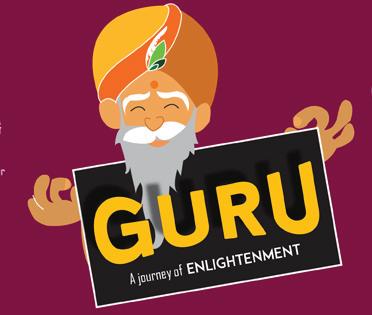 Gargi Pandey
Hannah Sterritt
Gargi Pandey
Hannah Sterritt
are your Student Led Services are student groups that come together to provide FREE services to help or support other students & the local Cardiff community CH PS
These
Pictured: Te poster for this year’s Elements showcase


Union

Make the most of meal times at university Get recipes, advice & food safety tips at cardiffstudents.com/eatwell
Presented
by:



BUCS results: Wednesday March 4th
Cardiff jump onto trampoline podium
Cardiff University Trampolining Club have finished a brilliant year with Te Dragon Cup on March 1st.
Tis is the most fun and exciting competition that is hosted by Cardiff University, the University of South Wales and Cardiff Metropolitan. So a huge thank you must go to Eloise Brian and Creys Erwood from CUTC who helped host it.
All the competitors from Cardiff University performed brilliantly and overall the weekend was a success with CUTC raking in the medals.
First off was Eloise Brian and Jess Heap who were able to secure second and third in women’s novice. Tis led the way for Beckie Tomas to win gold and Sarah Bettles to win bronze in the women’s interadvanced. Next up was the women’s elite where Rachel Woodman and Harriet Page gained first and third respectively. Niall Doherty proudly represented Cardiff in the men’s elite winning a silver medal. Tis was quickly followed by Cesca Claydon and Bryony Harper finishing first and second in women’s uber.
Not only did CUTC do well in the individual competitions but also stood out in the team categories. Team silver was earned by Brian, Heap, Vicky Stapley and Caitlin Doyle in the lower team category. Meanwhile Claydon, Harper and Woodman were joined with Becca Bough in winning gold in the higher team category. Claydon also gained second in roulette synchro, where the competitors are randomly paired with a stranger from another university. Te aim is to perform a high standard routine while matching the timing and execution of their partner. Tis is a notoriously difficult event and the whole team was proud of Claydon and his achievement.
Tough this weekend was the highlight of the year, it sadly is the last competition for some. Goodbyes have to be said to some very dedicated members of the club, including President Charley Bull, Vice President Vicky Stapley and Social Secretary Eloise Brian. However, the weekend was a bouncing success and Cardiff University Trampolining Club did not fail to impress.
Final day success for women’s rugby
Cardiff University..........................30 Plymouth University........................0
After losing to Bristol in the previous game, Cardiff women’s 1st were wanting to finish the league with a win.
Cardiff got off to a cracking start in the first half, pushing Plymouth back from the start and putting them under some intense pressure. Despite this, Plymouth managed to beat Cardiff to the ruck multiple times, meaning the ball kept being turned over to the Plymouth side. However, Cardiff
usually managed to win possession back quickly from the opposition.
Te constant pressure in the first half lead to the Cardiff players breaking through the Plymouth line to score Cardiff some essential tries. Cardiff also played well through the phases to gain even more points, which meant at half time Cardiff were up 30 – 0.
Te second half was a different story. Cardiff were not as clinical as they were in the first half; losing rucks and making unnecessary errors.
Plymouth were able to push Cardiff
back to the point where they came close to a try of their own. Luckily, Cardiff managed to hold off the Plymouth attack to secure the win.
Despite two different stories to the game, Cardiff made it a spectacular win, with most of the tries being scored by forwards.
Cardiff showed some dominant aggressive play and were also able to defend with their backs against the wall in the second half. Te team should all be proud of themselves due to the manner of victory.
It was also a sad affair with this
game being the very last BUCS game for the final year students. All Cardiff have to do now is improve upon certain aspects of their game ready for Varsity.
Squad: M. O’Sullivan, K. Davies, J. AP, C. Bingham, H. Hearle, R. Harris, N. Earl, E.Houghton, K. Davies, M. Compton, A. White, E. Crombie, H. Brench-Jones, N. Harrison, A. Berry, C. Butler, H. Cox, L. Cooper, A. Fleming, J. Benton, B. Stafford (c).
H/A Sport Team Opposition Result W/L/D H Badminton Men’s 2nd Bournemouth 1st 7-1 W H Fencing Men’s 1st Queen Mary University of London 1st W/O W H Football Women’s 1st USW Trinity St David Swansea 1st 6-1 W H Football Men’s 2nd UWE 1st 0-2 L H Hockey Women’s 2nd Swansea 1st 4-1 W H Hockey Women’s 3rd RAU 1st W/O W H Netball Women’s 2nd Exeter 2nd 34-30 W H Rugby Women’s 1st Plymouth 1st 30-0 W H Squash Men’s 1st Swansea 1st 3-2 W H Tennis Women’s 1st UWE 1st 10-2 W H Volleyball Women’s 1st Swansea 1st 3-2 W A Netball Women’s 7th Aberystwyth 2nd 29-27 W A Tennis Men’s 1st Bristol 2nd 12-0 W A Lacrosse Women’s 1st Exeter 2nd 9-10 L A Hockey Men’s 1st Exeter 2nd 3-2 W A Rugby Men’s 1st Loughborough 1st 15-26 L A Basketball Women’s 1st Winchester 1st 61-54 W A Rugby Men’s 5th Bath Spa 1st W/O W A Volleyball Men’s 1st Bath 1st W/O L
31
SPORT
Claire Isgar
Kelli-Jo Davies
32 SPORT Cont’d: Wales v Ireland

Continued from back page
Recent history favours the Irish, who have won the last two Six Nations clashes between the sides, including last year’s comprehensive 26-3 victory in Dublin.
Te potential absence of fly-half and top points scorer Jonathan Sexton could be a boost to Wales - Sexton has scored just under half of Ireland’s 63 points, with Ireland the secondlowest try scorers in the tournament - the kicking game, that revolves around the boot of Sexton, is key. Sexton, along with Sean O’Brien and Jared Payne, is a doubt for Saturday’s match.
Te feeling is that Ireland are more of the complete outfit though. Tere are gaps in the Welsh defence that have been exposed by both England and Scotland, and they will need to tighten up this weekend in order to come out on top, though the Irish have scored just three tries in total across their three victories in their campaign so far, compared with Wales’ four tries in two victories.
Te Irish defence, by comparison, has been in good form so far this term, providing a fearsome challenge for any team looking to penetrate it. Teir dominance in this area has arguably led to their position atop the
WIt would be nice to see Sexton face Biggar but the Welsh will have their fingers crossed that the match is too soon for Ireland’s talisman
table.
Ireland have the advantage of experience on their side as well, having won last year’s championship, and this time out they have the opportunity to win the grand slam as well, having already defeated Italy, France and England.
With the boot proving so lethal for both sides, they will each be looking to keep their errors to a minimum in an effort to prevent their opponents having too many three-point attempts at the posts. Ireland stepped up their game in this respect against England, turning their opponents over a total of 15 times while not conceding a single one in return. Wales will need to be inventive if they are to breach this tough Irish wall.
Wales have, however, been accused of being predictable in the breakdown and slow to distribute. While their backs offer pace and power from deep, their ruck and scrummaging could be improved. Tey are entirely capable of course, but need to be on point to prevent giving away needless penalties as they did in the France match.
Te Millennium Stadium roar will of course be a huge factor in this match; the 74,000-seater arena will


be full and fired-up for what could well prove to be the defining game of the tournament. It can be noted though that home advantage didn’t seem to make a difference as Wales went down 16-21 to England on the opening weekend of the tournament; Sam Warburton and his team need to stand up and play the match, not the occasion.

Ireland will go into this game as the favourites, with the better record this tournament and the more rounded and experience squad. But in players such as Leigh Halfpenny, George North, Sam Warburton and Dan Biggar, the Welsh are more than capable of causing an upset and setting themselves up for a shot at glory against Italy in two weeks.
Analysis: The battle of the half-backs
ales now know that their fate lies in their own hands following their impressive display against France and England’s defeat at the hands of Ireland. A win against the Irish would blow the tournament wide open and give Wales the chance of reclaiming the championship should they win against Italy by a large margin, with England and Ireland expected to be in the mix too.
Wales travelled back from Paris in high spirits following their hard fought win against Phillipe Saint Andre’s men and the match did no harm to Dan Biggar’s reputation as the Osprey fly half continues his rise to one of the top fly-halves around. Te Welshman was fearless as ever in the air and defence but also brave in his decision-making and execution when going forward, where he was rewarded with his first international try.
Biggar’s kicking out of hand has been absolutely spot-on in this tournament and it will surely be an exciting area in the battle between himself and Jonny Sexton when the pair face up in the Millennium Stadium on March 14th. In terms of form the two fly-halves are contending for the top-spot as the two stand out players in their position in the tournament and in the Guinness Pro 12 league.
Sexton was classy in his display against England and taught George Ford a lesson in the art of pulling the strings, with Ireland turning England over 15 times as they returned Sexton’s kicks, whereas Ireland did not get turned over on the return once, as they defeated Stuart Lancaster’s men in all aspects of the game.
Much like Biggar though, Sexton puts his body on the line week in, week out, and this took its toll against the English as he was withdrawn from the action shortly after the pivotal try of the match with a hamstring injury. For the good of the competition it would be nice to see Sexton face Biggar, but the Welsh will have their fingers crossed that the match is too soon for Ireland’s talisman and inexperienced Madigan will have to step in.
Rhys Webb also continued his red-hot form as he sniped the side of a ruck to allow the space for Biggar’s try. He will certainly be watched closely by Ireland’s Connor Murray in Joe Schmidt’s game plan, whether or not Murray will be quick enough to keep tabs on the Welsh scrum-half is another thing.
It is no secret that Webb’s chemistry with his Osprey team-mate Biggar has been fundamental to the scrumhalf’s rise to stardom, benching longstanding Mike Phillips in the process. His quick, accurate delivery has laid a great platform for Biggar and the other backs to execute their moves.
Likewise, the chemistry between Murray and Sexton is just as impressive, as the two have been instrumental to Ireland’s recent success, having not lost since their narrow defeat to England last year. Murray also possesses great individual ability too, assisting Jarred Payne’s try against England with an exquisitely weighted chip. Tis will be a battle to watch and will be key in deciding the outcome of the match and subsequently the tournament itself, as Ireland will fancy themselves as favorites to go on and win the grand slam.

Wales’ results so far: February 6th Wales 16-21 England February 15th Scotland 2326 Wales February 28th France 13-20 Wales Wales’ remaining fixtures: March 14th, 14:30 Wales v Ireland March 21st, 12:30 Italy v Wales
Liam Corcoran
Pictured: Above: Jamie Roberts breaks through the Irish defence in last year’s Six Nations
Left: Dan Biggar in action in Paris on February 28th
“ ”
Lifting the lid on your socials

All my favourite socials come from my first year of university. In my freshers year, I joined a Cardiff University sports team which is particularly notorious for it’s social scene.
Troughout my time in first year I ate things I never want to eat again, saw things that are now seared into my mind forever and drank enough
I’ve seen a lot of incredible things at socials and it’s hard to pick out just one moment that sticks out the most. In my first year, on my very first social I witnessed one bloke stand on a table with a cucumber and devour it in front of an enthusiastic crowd of about 50 people chanting “see that veg away”.
We asked for your best anecdotes and received these anonymous submissions “ ” “ ”
I can’t remember much past this moment, but as I woke up covered in my own blood and in the remains
It was entitled “Rookie Fun Day” and we as freshers immediately knew that it would be everything but fun. It was certainly uncomfortable but in a weird way it was enjoyable too.
We were told to meet at Pontcanna at 3pm, not a minute early and not a minute late (or risk the dreaded punishment). I remember it being a pleasant day, nice sunshine, gentle
On tour in Belgium after we had finished playing our tournament, around 40 naked lads were piled together in a communal shower intended for use by ten people at a time.
Well and truly sauced up by this

MCan you top these stories? Let us know! sport@ gairrhydd. com
y account comes from the other side – one of the poor individuals who works behind a bar, serving, observing and cleaning up after messy socials.
Recently, my bar was visited by a social of one of the AU’s largest clubs. Tis particular social resulted in the longest clean up and the most complaints I have encountered as a barman so far. Te theme was the standard bedsheet toga, complete with several twists.
Firstly, all of the members were
alcohol for a small island to have a damn good party.
One social that will stay with me forever, along with every initiation day and Varsity day, was the social where I believe the club really gave my year the chance to come together not as a bunch of rabbits in the headlights fearing for their sobriety, but as teammates and friends.
of my outfit from the night before. When I emerged from my room and went into the kitchen, my flatmates filled me in on what had I had done the night before.
Apparently I’d bumped into them in Uni Kitchen with my new best friend Yousuf, with pen on my face and the phrase “my dad has soft hands when he touches me” written across my chest. Once I’d returned home, with Yousuf of course, I had
breeze but the Welsh weather did its part in increasing the misery for us rookies.
It rained hard and turned bitterly cold, so much so that the veterans decided that to warm us up we would have to exercise in the river. Downing our Tesco value cans, it was time for the ‘chunder mile’.
Four cans remaining and we had to complete four laps of the specially
point, all of the showers were turned on and we circulated around the enclosed space until we were all clean.
After this altogether strange experience, a mass game of highstakes danger fives immediately followed. Te eventual loser out of the
tied together in pairs with a bucket between their hands. Te bucket, of course, was for chundering into.
Te second twist was that, while they were in this particular pub, those in attendance were only allowed to drink pints of Guinness, which had cinnamon and blue cheese randomly added to them throughout the night.
Tis ensured that everyone’s bucket came into good use.
One less hardy soul was not able to brave the December cold and had chosen to wear underwear under
At this particular social the freshers were given a 30 minute headstart, along with a list of pubs and a list of drinks. It was made clear to us that it was in our best interest to drink these beverages in each bar without being caught up by the second and third years, as there would be forfeits if anyone was caught.
After a blur of drinking and
apparently eaten two BBQ pizzas and told one of the girls how much I fancied her, before telling everyone else I loved them and offering to take them for ice cream the next day. Unfortunately we never did go for ice cream, though the most heartbreaking thing is that I’ve never seen or heard from Yosuf since. Despite feeling horrendous and missing my 9am lecture, it was without doubt one of the funniest
designed route. After each successful lap, a can had to be demolished. Two cans down and I was struggling, chunder dragons of all shapes and sizes projected vomit onto the damp fields of Pontcanna. To make matters worse we had to then down a cold tin of food (I had spaghetti hoops) which I decided to pour over my head – a wise choice in my opinion.
Te day had not finished there
collection of naked bodies received a bizarre punishment.
With one of our social secs in the middle of the room in his own special chair, the loser of danger fives was made to fondle his intimate parts to the jeers of the many onlookers.
his toga – this clearly broke some unwritten rule of the club and, after being forced to remove the offending item of clothing, was given the choice of eating copious amounts of blue cheese or having it rubbed all over his naked body. Perhaps fearing his bucket would overflow, he chose the latter.
Our pub was left in an absolute state, having been covered with spilt or thrown Guinness and blue cheese, which is not a combination of smells I wish to encounter again. All of the
throwing up from the centre of town to Cathays, we made it to the last bar, where the seniors were waiting for us: they had taken a taxi. Tis definitely wasn’t the most loose social I attended, but one that had a significant impact on my university life.
Te moral of the story is this: if you’re a fresher, you cannot win (but it’s definitely worth it).
mornings of my life.
Once I heard similar stories from other freshers on the social and found out I wasn’t alone in my disgrace I got a real sense of what it meant to be part of a club at university and how much fun socials would be.
I can remember very little from my first social and I felt awful in the morning, but I met some of my best friends that night which is why is think of it as my best social experience.
though. Our prison suit costumes made us look like a bunch of criminals as we entered the veteran’s houses for even more ‘punishment’. As soon as I took my first few steps into the house I was gone and the rest is an absolute blur.
Still to this day I am thankful to the brave cheerleader and the knight in shining armour who took me back to my halls, safe and not so well.
Tis was not the most enjoyable social experience of my time at university, but it is one that will live long in the memory as an important bonding and character-building experience – though I have never been happier to win at danger fives.
other customers we had that night complained not only of the noise and naked bodies, but also of the vile smell, which lingered for at least a week afterwards.
Later in the night, we discovered several pint glasses filled with what we assumed to be leftover Guinness – it was in fact the surplus vomit that could not be contained in the buckets.
I fear the next time our pub is selected as a social venue. Tough the night provided some entertainment, the clean-up certainly did not.
33 SPORT
“ “ ” ”
“ ”
34 SPORT Team Talk: Comsci F.C.
Computer Science’s IMG captain Ben James discusses all things banter, as well as his team’s form and old rivalries

What is Comsci FC? Comsci is just short for Computer Science and we play in the IMG 11-a-side league representing the course.
What is your role as captain of Comsci FC?
I have to pick the team. Tere’s an on-field joke that one of the other players captains the side on the pitch, but mainly I’m picking the team during the week and organising training.
Do you have a big squad to pick from?
effective, we now concede far fewer goals. However we are prone to the odd mistake which has cost us games. In the first half of the season we beat Planderlecht 2-1 and we were so secure in defence that day and they couldn’t break us down. We started the second half of the season well but lost against Psycho which was disappointing. We have Badminton next who we will play with respect, despite them losing quite a few games.
but we lost to them. We are looking forward to playing Badminton because one of our former players, Shaun James plays for them now, so it would be nice to beat them!
Is there good banter between the teams?
Oh yes definitely, we have a lot of jokes. We have a fresher called Chris Wheatland and we call him Weetabix so we have plenty of nicknames and good banter within our team especially.
remember someone passing it to Ben from the middle of the pitch and he flew around three quarters of the field and then finished it. He skipped past players, it was just like watching Gareth Bale.
We have a fresher called Chris Wheatland and we call him Weetabix
Yeah, we had an influx of players due to people returning from last year’s team and a lot of freshers joining. I did, however, deliver a terrible talk at the start of the season but luckily some freshers remained interested and joined. We have some good freshers who joined up, so hopefully they’ll carry the Comsci team on into the future, maybe that’ll be my legacy as captain!
How has the form been this year?
It has been a little inconsistent to be honest. We tried four at the back at the start of the season and it didn’t really work, so now we play three at the back and it’s been much more
Steffan Thomas When the season began way back in September, many believed that the Cardiff Blues would finish as the strongest of a mediocre bunch of Welsh regions. Yet fast forward six months and the capital city region is in disarray once again, with Director of Rugby Mark Hammett having left his post just six months into a three year contract.
After a barren spell at the Arms Park that saw attendances drop significantly, and not one iota of success on the field of play, the Cardiff Blues board set out on a worldwide search for a
As you’re a Cardiff City fan, where would, let’s say, Peter Whittingham fit in and what would he bring to Comsci FC?
He’d be excellent at set pieces for us, which is an area we lack despite having a couple of physical players who have the ability to get a header in. I reckon he’d be magical during a set piece. We would have to fit him into a three-man midfield if he joined though.
Has your form this season been a bit like Cardiff ’s inconsistency?
I’d agree with that but I don’t think we have been quite as bad!
Is there a team who you look forward to playing the most? We were looking forward to Maths,
replacement for Hammett that could push the region forward. Hammett was originally supposed to be that man – a former All Blacks hooker who would come in with the intention of reinventing the culture at the Blues, and instilling a winning attitude. Nobody in their right minds expected the Blues to challenge for silverware this season, but at the very least there were supposed to be signs that that one of European rugby’s sleeping giants were back on the right path.
However, with rumours that the
Do you have socials?
Yeah we do; we mainly go to Retros on Wednesday nights. We have a couple of themed nights planned such as International night - one of our players last year dressed in a traditional Welsh female dress which was funny.
Who is the biggest character on socials?
George Sinfield was a complete wreck last time, he was drunk by 11pm and he is a bit of a party animal. Our socials officer is a bit wild and we have to control him sometimes.
Who is the Gareth Bale of the team?
I’ll have to say Ben Lourence, I
Kiwi coach had lost the faith of the dressing room, he mutually agreed with the Blues board, rightly or wrongly, to be released from his threeyear contract. Te vast majority of the criticism from Blues supporters have been directed either the way of Hammett, or the players. Of course both the coaches and the players must take responsibility for a poor season, but it is the Blues board who must surely take the blame for this whole catastrophe.
Far too often the board have got decisions wrong in terms of recruiting

coaches and players, which has resulted in a large proportion of Blues followers losing faith with the region. It is therefore vital that the Blues board get their next appointment right, with the role becoming somewhat of a poisoned chalice since Dai Young departed for the Aviva Premiership four years ago.
Te next appointment must have a clear strategy to take this region forward, whether that be in terms of recruitment, or on field tactics, for one senses that rugby union in that capital city is running out of opportunities.
 James Lloyd Pictured: Above: Tere are some cereal banter merchants in Comsci F.C.
Left: Peter Whittingham, sent off after the banter became too much for him
James Lloyd Pictured: Above: Tere are some cereal banter merchants in Comsci F.C.
Left: Peter Whittingham, sent off after the banter became too much for him
“ ”
Sport’s Pitch: Te state of refereeing
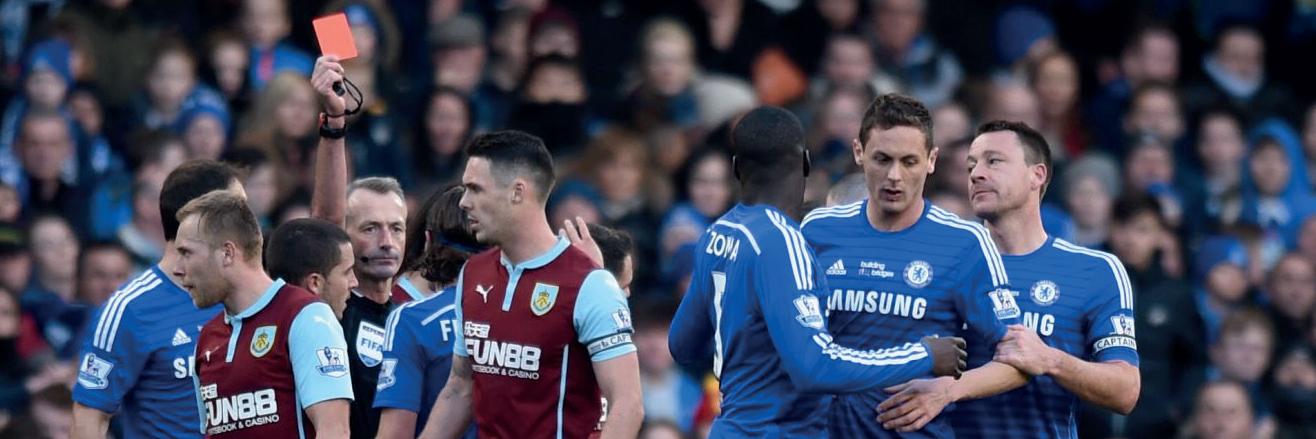
Howard Webb has said that Premier League referees are hurt by recent criticism of their standards and professionalism.
Te recently retired Webb, who refereed the 2010 World Cup final, has offered advice and support to match officials feeling pressurised.
His comments come in the wake of a series of controversial high-profile decisions, which have aroused a significant level of debate about the current quality of officiating. So to what extent is this criticism justified?
We’ll begin with an incident from a couple of weeks ago; the sending off of Chelsea midfielder Nemanja Matic for pushing over Burnley’s Ashley Barnes, after the striker had put in a studs-up challenge on the Serbia international. As much as you can sympathise with Matic for his discontent, referee Martin Atkinson certainly made the right decision to send the Serbian international off ; he quite simply reacted too aggressively.
Players and managers also try to get opponents sent off, causing officials to feel intimidated
Whether Barnes should also have been given his marching orders is questionable. As Burnley manager Sean Dyche mentioned, there was very little reaction by anyone on the pitch or from the stands to the initial tackle other than Matic himself. Atkinson was behind Matic when the tackle took place so it was difficult for him to see where Barnes’ foot landed. It was certainly a high tackle with heavy impact, and although it didn’t seem malicious, with retrospect he should have left the pitch as well.

March isn’t even a week old; the daffodils aren’t yet in bloom and already so much has happened at Cardiff City. Te last day of February saw the Bluebirds host Wolverhampton Wanderers - and perhaps more significantly their longabsent owner Vincent Tan.
Yes, before kick-off, a lesser-spotted Tan, accompanied by rarely-praised chairman Mehmet Dalman, walked around the pitch, waved to fans, signed autographs, all before opening his suitjacket to reveal that he was wearing a - BLUE - Cardiff jersey. I never thought I would see the day.
An incident that was much less ambiguous surrounded Sunderland defender Wes Brown, who was given his marching orders for a last-ditch challenge on Manchester United’s Radamel Falcao. Despite claims from the FA that this was not a case of mistaken identity, it clearly was; John O’Shea, not Brown, evidently had his arms around Falcao. While the referee rightly awarded a penalty, he bizarrely punished Brown despite the defender making no contact with the Columbian whatsoever.
In addition during Stoke City’s clash with Hull City, both Stephen Ireland and Maynor Figueroa could have easily been sent off for a pair of dangerous challenges – Ireland was left with a severe gash on his leg that required a number of stitches. However neither player saw red, inciting the fury of respective managers Mark Hughes and Steve Bruce.
Numerous factors have to be considered here; firstly, the referees are occasionally in awkward positions, as Martin Atkinson seemingly was, restricting their ability to make the right decisions. Of course sometimes this is their fault for being out of position. Nevertheless, the presence of fans will certainly influence the referee’s decisions as will the increasingly pervasive theatrical playacting, making referees’ jobs even more difficult than it already is.
Players and managers also try to get opponents sent off, causing officials
Perhaps Tan could have donned a pair of shorts, socks and boots and actually played against Wolves - he couldn’t have been any worse than City’s starting eleven, that’s for sure.
A dismal performance from the home side was capped off by a quick finish from Bakary Sako to give the visitors all three points.
To make matters worse Peter Whittingham, who had played every minute of every game this season, was even sent off Tat’s right, Whittingham - yes, Whittingham - tackled someone. Badly. Twice. It was that kind of game.
to feel intimidated. Arguably, some of these factors should not affect referees as they should be professional, but they do have an impact regardless of how hard referees try to remain composed. Quite simply, referees need more help. Te standard is certainly not improving, and whether it is declining is difficult to tell - how often do we hear praise for referees when they have made good decisions? Very rarely.
However, it is not just in the Premier League that refereeing is the subject of scrutiny. In Cardiff ’s IMG football league, it has been made apparent that some poor refereeing has been costing teams matches, much to the anger of some IMG captains.
Comsci FC captain Ben James, expressed his concern for the game and suggested what could be done to improve the standard of refereeing. In an interview with Gair Rhydd, he said: “Te problem with it is that the teams who don’t play have to elect a player to referee the game and the people they pick just don’t want to be there and they won’t really be watching.”
He added: “Tey sometimes listen to the linesmen too much and they don’t concentrate enough in the game and just go off the linesman.”
James said that this has happened frequently during games he has played in, where a goal has been scored and a flag has gone up for offside, thus making the referee disallow the goal.
“It is very frustrating because you
Prior to kick-off the City midfielder had even had the nerve to ask Tan why he had stayed away for so long. On this evidence, it wasn’t hard to see why.
Tings changed for the better however, when Cardiff travelled to New York Stadium, in Rotherham. Not as glamorous, but pretty rewarding, as Russell Slade’s men found out. By half time they were three goals up, thanks to strikes from the excellent Bruno Manga, the at times lacklustre Federico Macheda, and young loanee Conor McAleny, with City running out 3-1 winners in the end. Slade’s
might score and then the flag will go up, and the referee will listen to the linesman and it is blatant cheating really. It has happened to us about four times this season”.
Due to financial constraints, it is too difficult for the IMG league to hire FA qualified referees to oversee the fixtures. However, James has proposed a short refereeing course for the IMG captains to follow: “It would be ideal to get proper referees in, but they would have to be paid. Maybe captains should go on a course, like an hour or two of introduction to refereeing to learn the basics”.
Te fitness of referees has also been questioned in the IMG league. IMG captains are becoming increasingly frustrated with the lack of movement and effort by the voluntary referees. James recalled an incident when a referee turned up only to spend the entire time on his phone. “Te referees who turn up should be keeping up with play, not just standing in the centre circle, last year we had a referee who was on his phone the whole game, standing in the centre circle, which isn’t good.”
James, who is also a Cardiff fan, has noticed a decline in the standard of refereeing in the lower leagues, citing the poor standard of officiating in the Premier League as a contributing factor: “Te standard in the Premier League is dipping which is having an effect on the lower leagues, I went to the Cardiff game at the weekend and that was affected by the referee.”
decision to leave big names Kenwyne Jones and Craig Noone on the bench was vindicated, with City climbing into mid-table.
So, with the good and the bad out of the way, the ugly rears its head once again. Te club are considering asking for a legal judicial review, or going to the European Court for Sports Arbitration, if former manager Malky Mackay is not charged by the FA over the ‘Textgate’ affair. Te board are even preparing to contact FIFA if this fails. As I say, a week is never an uneventful period at Cardiff City.
IMG captains are becoming increasingly frustrated with the lack of movement and effort by the voluntary referees
Dan Heard
35 SPORT
Pictured: Nemanja Matic (second right), was sent off for reacting to a dangerous tackle
Jamie Smith
James Lloyd
“ ”
“ ”
tweet us @gairrhyddsport
email us sport@gairrhydd.com or visit us online at gairrhydd.com/sport






Wales face Ireland in Six Nations decider
Warren Gatland’s side need a win as they face the unbeaten Irish in this Saturday’s Six Nations showdown in Cardiff
Joe Atkinson
David Hooson
Wales’ Six Nations hopes hang in the balance with a crucial match at the Millennium Stadium against the unbeaten Ireland coming up this Saturday. If there is to be a Welsh championship triumph, Warren Gatland’s side will require a big win over the Italians on the last weekend of the tournament should they beat Josef Schmidt’s in-form Irish outfit in
Cardiff
Meanwhile victory for Ireland would basically seal a grand slam for them, with their last fixture coming against wooden spoon candidates Scotland. Victories in England’s final two games against Scotland and France respectively would also give Stuart Lancaster’s men a chance of sealing their first Six Nations victory since 2011.
Te Cardiff match comes on the back of Wales’ morale-boosting victory over France in Paris, a 20 points to 13 victory that rejuvenated their title hopes. Leigh Halfpenny and Dan Biggar were big performers on the night at the Stade de France and will need to be at their best to defeat a defensively solid and astute Ireland.
Te game kicks off at 2.30pm on Saturday and will undoubtedly draw a
full house at the Millennium Stadium as well as many flocking to the city centre as Welsh fans hope to see their team play up to their huge potential.
Biggar and captain Sam Warburton both picked up injuries out in France, but are expected to be fit for the game.
George North, fresh from his 50th international cap, will also need to be on the top of his game if Wales are to pick up an all-important victory.

Continued on page 32








SPORT
Refereeing in decline? P35>> Your best social stories P33>> Ladies’ rugby report P31>>





































































 Kirsty Fardell
Kirsty Fardell




















































 Pictured: 2010 TV debates
Pictured: 2010 TV debates






 Pictured: Above: Images from the 1931 film Frankenstein (Source: Insomnia Cured Here, Flickr)
Pictured: Above: Images from the 1931 film Frankenstein (Source: Insomnia Cured Here, Flickr)



















 Gargi Pandey
Hannah Sterritt
Gargi Pandey
Hannah Sterritt












 James Lloyd Pictured: Above: Tere are some cereal banter merchants in Comsci F.C.
Left: Peter Whittingham, sent off after the banter became too much for him
James Lloyd Pictured: Above: Tere are some cereal banter merchants in Comsci F.C.
Left: Peter Whittingham, sent off after the banter became too much for him















